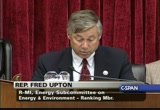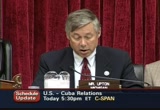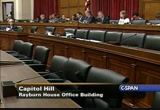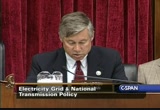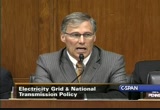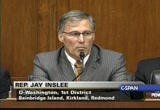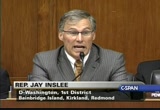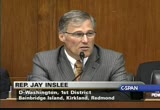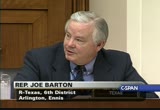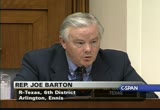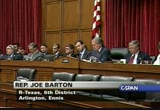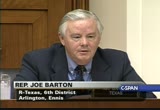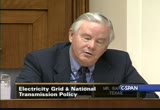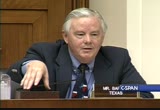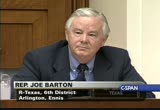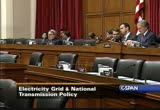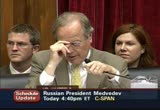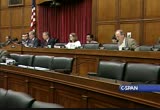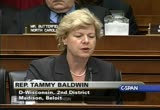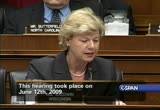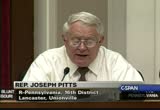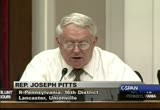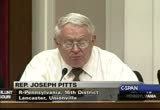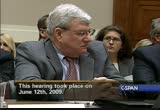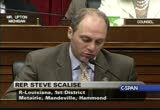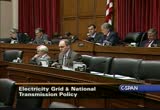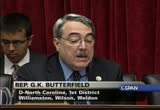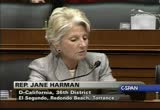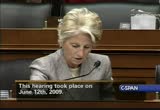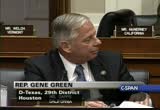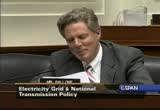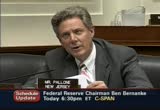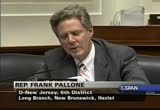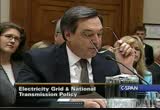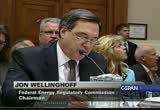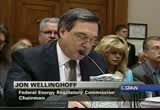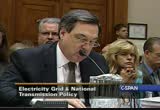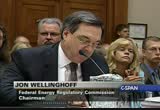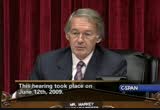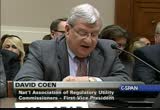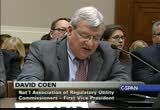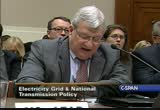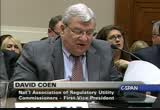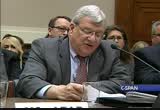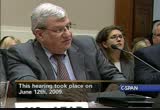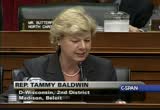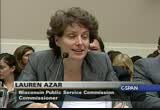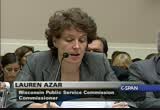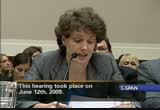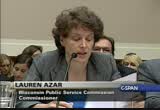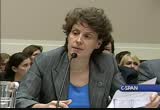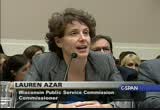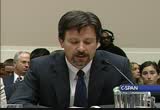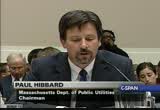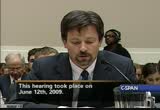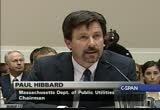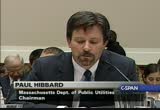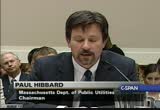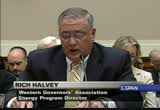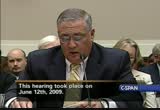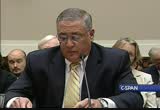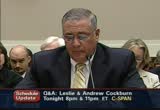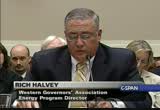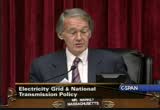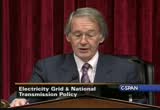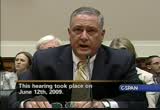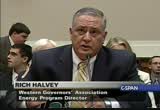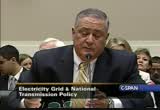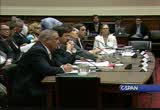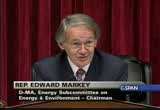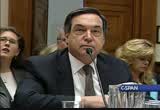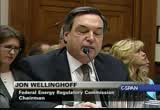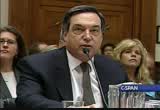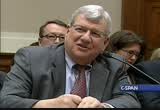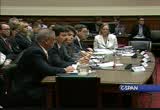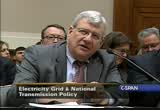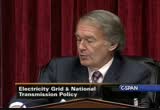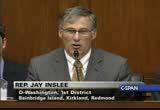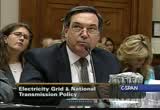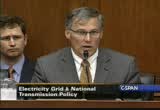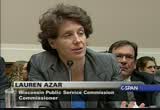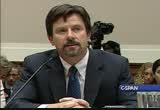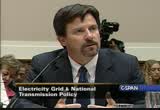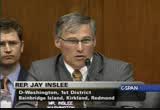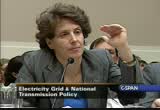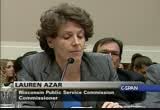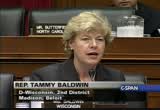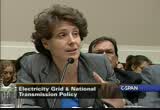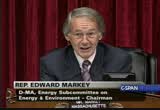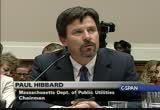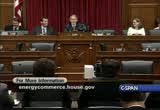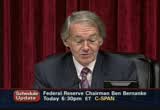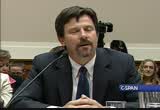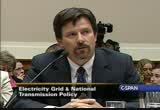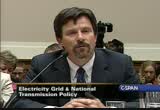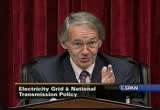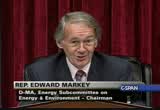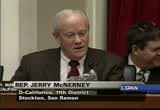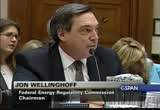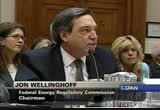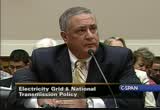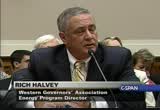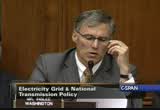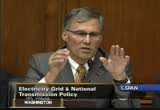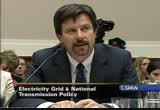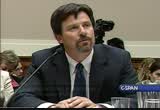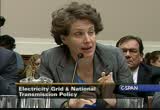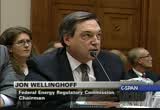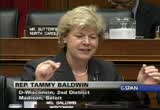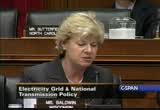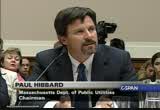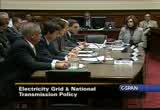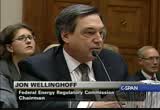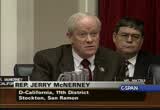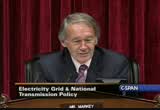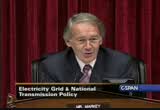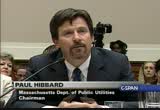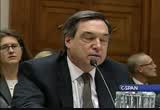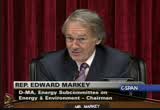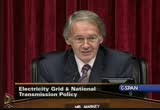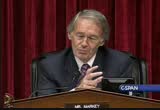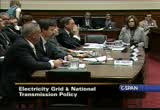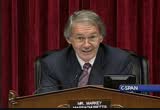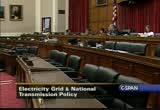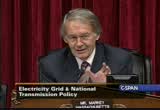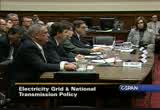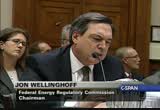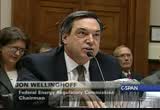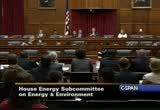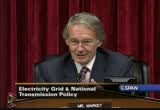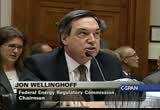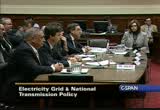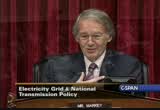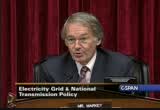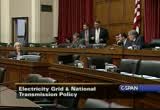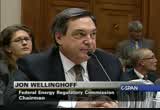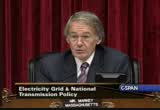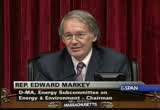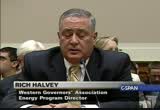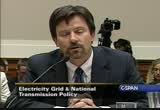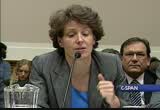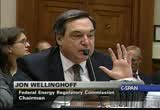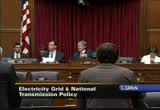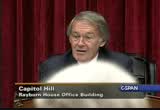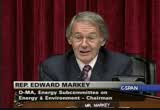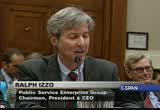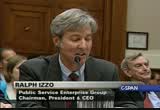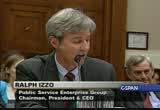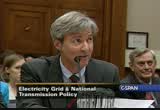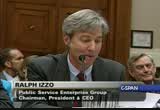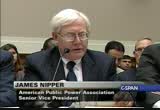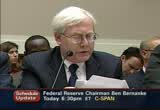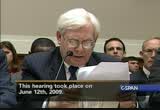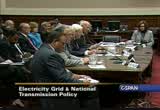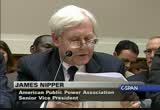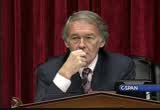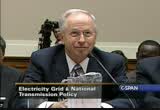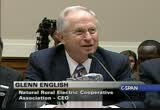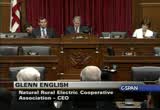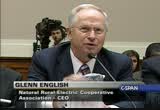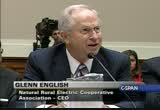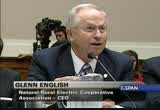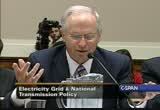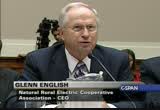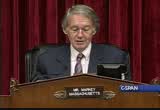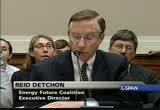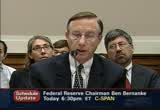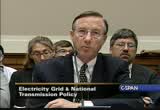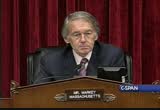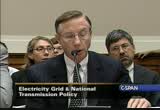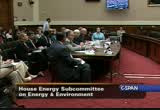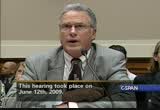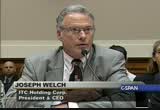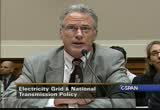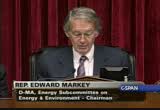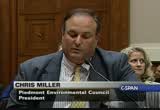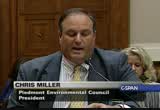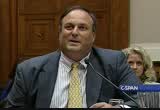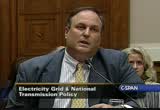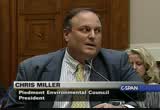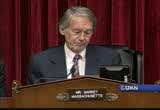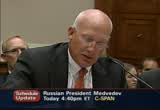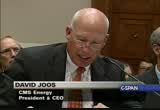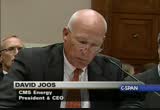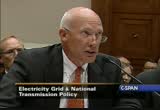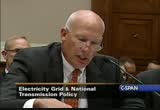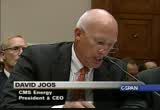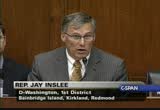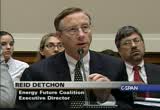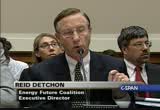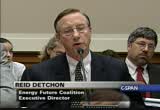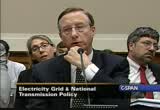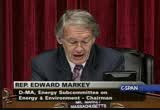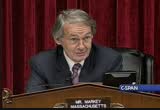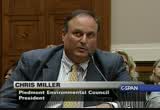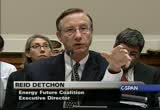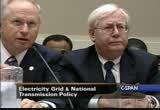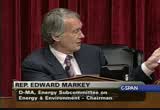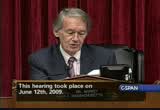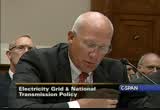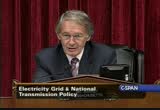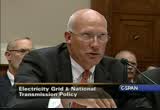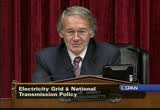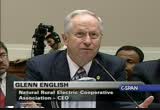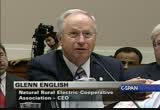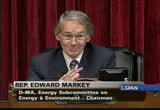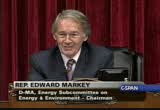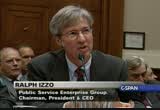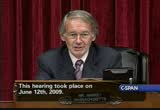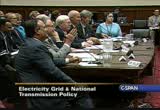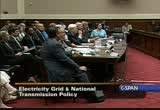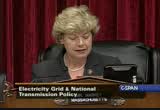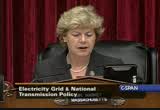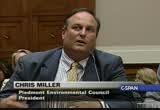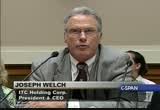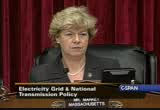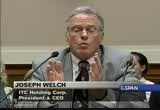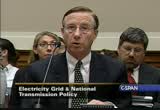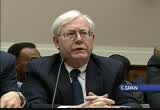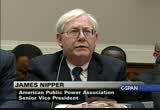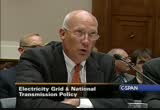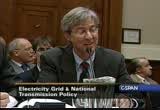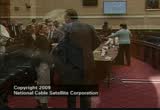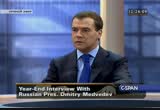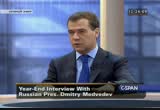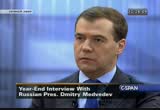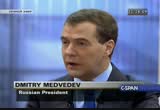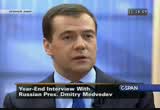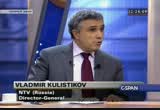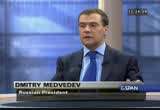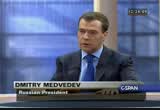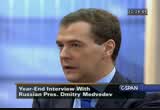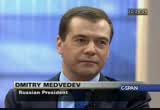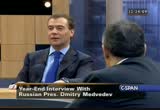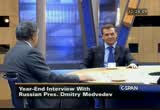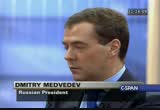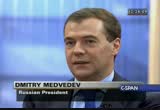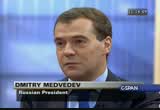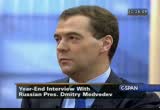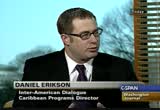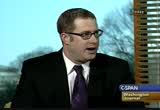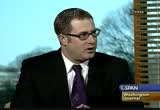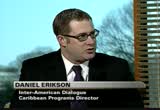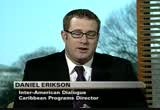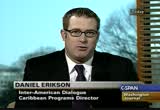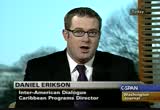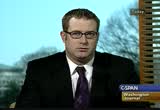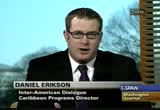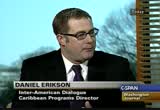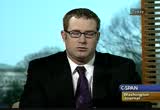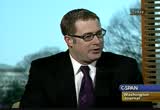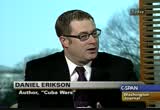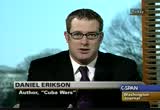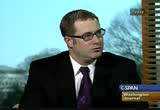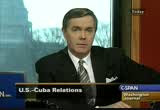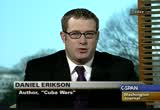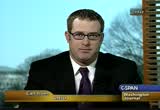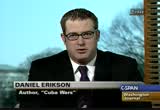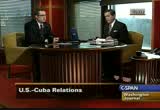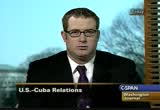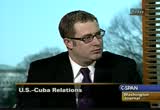tv C-SPAN Weekend CSPAN January 3, 2010 1:00pm-6:00pm EST
1:00 pm
this committee passed a sizable grenoble electors a minute without any consideration to the question of getting the removal of a trustee to population centers. the strongest winds are concentrated in low population area, also with the sun concentration. there are inadequate high- voltage lines tourists with most abundant sources of renewable power. if we want to be serious about renewable power we have to revamp the grid. to properly do so we will have to block the lawsuits from environmental groups that have increased costs and blocked much needed transmission lines, but let's put it into perspective. according to coe it would cost $60 billion in new transmission lines to reach the 20% mark for
1:01 pm
1:02 pm
power and solar power are often in these remote areas. transmission lines are needed to get electricity to consumers and i feel it is a mistake to legislate this mandate without addressing the transmission issue. that said, we must recognize that many of these sources are not liable. transmission lines cannot distinguish between electrons and how they are produced. we have to take all sources into account. changes need to be made to the current regulatory system to provide a backstop. we must not completely abandon the state and local process. we must also be mindful of the cost. renewable power is not freed.
1:03 pm
transmission lines are not freed. consumers deserve to know and understand exactly what they're paying for with their hard- earned money. consumers will already be saddled with the rate increases. they will only go up after this bill. transmission policy should not add to the burden. i yield back. >> the gentleman from washington state is recognized. >> thank you, mr. chair. thank you for holding this hearing and your great work assembling the bill. i think that the bill is a tremendous mosaic of using multiple tools to solve all our energy problems. but it is really missing one critical piece. the piece that will help us to spur the development of a 21st century national grid. i think we have to recognize
1:04 pm
that today, despite the tremendous efforts of the people in this field, we have a great fit for the 19th or 20th century, but not for the new challenges of the new american energy policy. the way i would categorize that new challenges that we used to be able to move our energy components around using trucks and rail. we could move coal to the site that we wanted to generate electricity. we could move natural gas to the site where we wanted to generate electricity or heat. but we cannot shift protons on rail cars. nor can we ship wind through packages or trust. the electricity has to be generated locally. our existing policy on the grid is satisfactory for the first scenario, but not the second. i have been at this for some
1:05 pm
time, hoping to advance our ability to plan and finance the new system that will be fit for the 21st century. introducing this bill, making some progress and hopefully further progress in the hopes to achieve this goal in this energy bill. number one, our good system is doing good work today. i do not know if you can say that the grade is broken. but if you have a horse and buggy system that is working, it might not be fit for the new world. we know that it will not be fit for the challenges of tomorrow. while it is not broken, it is not fit for what we are asking it to do. it is my belief that if we are going to mean the appropriate and necessary 15% renewable energy goal, we will have to allow transmission to move forward. i would point out that the reason we are here today is that
1:06 pm
this is the only vehicle moving out of town and it will be the last and only chance to move forward on this effort. we cannot move forward with renewable a electrical standards without transmission pieces. the old lyme from abraham lincoln fits. as the case is new, so should we think new. so is the backstop the event of regional governments that are not able to provide necessary facilities. the reasons are two fold. one, the grade is designed to respond to local and regional interests. with the challenges of global warming needs, we have the challenge for a national grid. while all of our constituents flood electricity, almost none of them love electrical lines.
1:07 pm
and sam will need to step in and overcome the reluctance by all of us for the assessment of moving electricity. we know that we cannot wait decades to move them. i hope that we can get this job done for this bill. thank you. >> the chair recognizes the gentleman from kentucky. i am sorry, the ranking member of the full committee, the gentleman from texas. thank you. since we have an oversight hearing upstairs, it helps me to give my statement now. i'm going to give a double statement. we talked about this hearing, and i would like to comment on your personal comments. i think we need to elaborate on that a bit. on hearing before us, it is a scary thing when i agree with
1:08 pm
jay. but i do. his amendment in the committee on climate change was directed, as i recall, towards green or clean energy for transmission. but once generated. either through wind, solar, or coal power, electricity as electricity and it will go on the same wires and they do not know what the source of the generation was. so, we need to update our transmission grid. we started that process in 2005 in this institute. i thought we had bipartisan support and became a lot. the fourth circuit recently ruled that parts of it are not as they should be. i disagree with that court ruling and i hope that the
1:09 pm
supreme court will overturn it. in any event, i agree with the congressman, we need to modernize the grand. we need to give more authority to ferc to make decisions on interstate commerce when the states cannot do with themselves. we tried to do that, but if that is not the right way we could perhaps try a different way. in the natural gas act, we gave the right of eminent domain do the ferc. i do not know that we need to go that far. and there is probably a middle ground. so that the states can work together. in any event, mr. chairman this is a good hearing.
1:10 pm
now, let me comment on what you said, chairman, when you were talking about the letter from june the ninth. your comments towards the ceo of middle american. first of all, i am very appreciative of what you have said. it was not intended to intimidate, you called him in and have taken steps to correct what you said as a misunderstanding. to say that publicly means a lot and i appreciate your doing that. let me elaborate on why people like myself have expressed concerns. you cannot make the best public policy if you do not have witnesses coming before the committee to give their honest assessment of what ever the issue is before this committee. if we adopt a standard and the only witnesses to receive input
1:11 pm
are witnesses that testified to the side of the question that the majority is supporting, you do not really have a full and fair debate on the issue. in the instant the you alluded to, but david represented a point of view that was contrary to the majority's position on climate change legislation. as well as the allocation system that is a part of that. that is a side that needs to be presented to the american people. it may be serendipity or inadvertent, but within two hours of his giving that testimony held up a letter was sent under your signature to the chairman of the regulatory commission asking six generic questions and two specific
1:12 pm
questions about his company. the chairman was asked to respond, in writing, to you by the close of business yesterday. how can that not be perceived as an attempt to intimidate? the position of the majority, having received said letter in the afternoon from the chairman of the committee over the jurisdiction from your industry and company, asking probing questions about the contacts in business decisions of the company. now, i take you had your worm when you say that that was not intended and you are beginning to take steps to correct it. but what upsets myself and the others on the minority is that we do not accept that we can develop a mechanism where we allow any member, let georgie or
1:13 pm
minority, to threaten, intimidate -- majority or minority, to threaten, intimidate, on behalf of the people of the united states of america. you have already taken steps to correct the perception that perhaps intimidation was being attempted. and i commend you for that. you are going to get a letter from myself and other members of the minority later today asking that we consider those discussions to make sure that we make that absolutely clear that any citizen of this country that comes before this committee can testify to what ever they believe is the truth as they know it without fear of intimidation or retribution. i think that members on both sides of the aisle will share that goal. we are absolutely certain that that is the way that it will be,
1:14 pm
nothing else will be said. again, you and i have been friends for 25 years. i hope we will be friends for another 25 if we both live that long. i have nothing but personal and professional respect for you and your conduct. i am honored to sit on the same committee as you. i have sat in that chair as the chairman. i think that we can get this worked out. but did is a serious issue and it deserves serious consideration. to your credit, you are giving it that serious consideration. with that, i yield back. >> thank you, gentlemen, for your words. the chair turns to recognize the gentleman from california. >> thank you, mr. chairman. i want to thank you for holding this hearing.
1:15 pm
this is a complex and difficult issue. i would like to thank the chairman of the ferc. it was a pleasure to visit this weekend it was a good, worthwhile use of my time. this issue is complex and difficult, as i said. i believe that the outcome will be best if we do our homework, consider the challenges, and to devise a rational plan. thank you for appearing and i look forward to your testimony. with that, i yield back. >> the chair recognizes the gentleman from kentucky. >> we look forward to this hearing today and we welcome the witnesses in and look forward to their testimony. i want to make a couple of points. if the advocates for the renewable energy mandate are successful, there will be large
1:16 pm
portions of the midwest that do not have solar or wind power sufficient to meet the needs. it will be extremely difficult to meet this 20% renewable mandate. not without federal involvement regarding the financing and the abilities of the jurors -- additional transmission lines. particularly when you consider the department of energy's 20% wind energy thing, where they will have to build at least 12,000 new transmission miles in lines to meet that need. on top of that, when you consider this court of appeals decision that the ranking member mentioned, which makes it more difficult to operate in this area for ferc. i think we have significant issues and i hope that we can resolve them. i yield back my time.
1:17 pm
>> your time has expired. the chair recognizes the gentle lady from wisconsin. >> thank you, mr. chairman. transmission is critical to the nation's electrical system. i certainly support expansion of the grid. i have significant concerns over the recent federal proposals that jeopardized regional efforts to develop a grid. specifically in their ignorance of progress and the slowdown of investments being made in states like wisconsin and others in the midwest. over the last seven years in wisconsin we have supported more than $2 billion in investments in our transmission system. these actions have been and will continue to improve reliability, increasing the flow of renewable energy in wisconsin.
1:18 pm
congress must make sure that we are not undermining the existing processes if we are hauling to venture into this position. especially when these positions already exist for state authorities, safety, and eminent domain issues. as the issues are examined there are questions and challenges that must be kept in mind. to will pay for this? the people of receiving the benefits? i am hearing strong concerns about designing our transmission corp. -- system for one specific purpose. it is not the job of these companies to choose the type of generation for transmission. transmission is needed plain and simple, regardless of the type of generation. where i come from, transition -- transmission is a sensitive subjects. it will be difficult to convince the people that in
1:19 pm
national interest the federal government is taking their property and running the extension cards -- extension cords across it to power larger, urban areas many miles away. what will it be like as a federally developed process? the costs are significantly increased, perhaps as much as $3 million per mile. mandating within the region has had significant ramifications. i share the goal of making sure that significant investments are made, but we must proceed with caution to not undermine existing efforts. thank you, mr. chairman. >> great. the chair recognizes the gentleman from pennsylvania. thank you, mr. chairman. thank you for holding this hearing on national transmission policy. the official report on the 2003
1:20 pm
northeastern blackout included that b.j. as evidenced by the minute -- absence of major projects undertaken in north america over the past 10 to 15 years, utilities have found ways to increase utilization of existing facilities to me the man without adding high voltage equivalencies. clearly there is a significant need for increase in transmission capacity. this is amplified as we consider adding more to while i am in full support, i think we need to keep in mind legitimate desires of localities to preserve green spaces and historic sites. my district has one of the most historic landscapes in the mid atlantic's. we have some the most productive farmland in the united states. valley forge, chester county,
1:21 pm
one of william penn's original three counties. the tradition of preserving the land and being good stewards of the earth has been passed down from generation to generation. we are not against progress, but we want to protect our heritage. having the needed energy to turn on lights and heat water is critically important to the quality of life of every american. however, the natural environment of communities contributes to quality of life as well. we need to make sure that all stakeholders are included in deciding where and when of these lines are cited. dialogue and compromise are key in the issue. it is critical to strike a delicate balance between the crucial needs of the country while maintaining open space areas that make the country beautiful and unique. as the committee continues to
1:22 pm
pursue this issue, i hope that we will hear from all affected parties. mr. chairman, i am grateful for the opportunity to discuss this issue and it is my hope that today is the first in a series of days to ensure a robust approach to national transmission policy. >> i thank the gentleman, and the gentleman recognizes the chairman from vermont, mr. welch. >> thank you, mr. chairman. i just want to get my microphone to work. i am proud that we have here today, as one of our witnesses, david cohen. he is a member of the public service board in vermont, serving in his third term. he has been appointed by republican and democratic senators alike. he is now the vice president of the national association of regulatory utility commissioners.
1:23 pm
he is very sensitive to the particular needs of rural utilities in small states. but this issue of transmission is incredibly important to us, as it is all around. i want to welcome him for being here and adding to the testimony. thank you. >> the chair recognizes the gentleman from louisiana. >> thank you, mr. chairman. renewable energy will play an important role in the future of national energy policy. i support the development of these energy resources. we have drafted into legislation the renewal will sources of energy. as waves for the expansion of energy sources like wind, solar power, and hydroelectric power, we must not neglect that any
1:24 pm
individual resources need to be backed up by other sources of energy. we emphasize the importance of diversifying the energy portfolio, making sure the nuclear power is a part of energy -- carter in policy discussed. we still need to overcome fundamental obstacles, we cannot rely on fundamental sources of low. when the sun stops shining the hospitals that care for our families we must continue to have reliable energy to make sure that the lights stay on. in addition energy policy is important to the conversation, as is -- >> the gentleman is time has expired.
1:25 pm
the chairman recognizes the gentleman from north carolina. >> thank you very much, mr. chairman. i will be moving to have the benefit of the microphone. it goes without saying, mr. chairman, that i support the expansion of the grid using 21st century technology. taking dramatic steps to further the growth of renewable elector generation. the nation already has a standard for those sources, the prices used on a carbon cap moves forward, we must focus on developing the insurance of load centers that have the demand. meaning that we must address the inefficiencies in the transmission grid that the last from reaching full generation potential. there are a number of challenges
1:26 pm
to improving transmission. society will be particularly difficult to overcome. balancing the needs and interests of individual stakeholders will be critical to the completion of a modernized to grid. allocation and ownership will also prevent challenges, as we have heard today. our far from collaborative nature will be addressing the issue further. i yelled back. >> thank you. the chair recognizes the gentle lady from california. >> thank you, mr. chairman. on the floor we are debating a bill to regulate tobacco and it is a long time coming and i am thrilled that we will finally, i believe, pass it and it will become law very some. while i am celebrating about that, but i am thinking about a hard issue that will require all
1:27 pm
of us to step up and think about some risky strategy is to make certain that the promise of renewable energy and the absolute need for transmission of electricity throughout the country can be accomplished. i think that anything we do in this committee is going to make friends and enemies. that applies to us regardless of which party we are in in which region we are from. but i think that we must step up, as many people finally have in both parties to the need to regulate tobacco. i would like to point out some of the obstacles. the u.s. electric transmission system encompasses about 167,000 miles of high-voltage transmission lines and 300,000 lines of lower voltages. the great is operated by 130,000
1:28 pm
balancing authorities, to the locally owned centers to monitor and control the grid. those systems are owned by several hundred private and public entities. just starting the that alone, it is incredibly complex. if we don't get a handle on that, we will not step up to the tough decision and solve problem. if we really want renewable energy in this country we have to fix the grid. thank you. >> the chair recognizes the gentleman from texas. mr. greene. >> thank you, mr. chairman. i have a statement for the record. in the 2005 energy act we provided to the federal transmission corridor that was so heated, as my colleague said hello we disagree with the court decision and we hope it will be overturned by the supreme court. there are things that we can do
1:29 pm
that might help. i appreciate the legislation to expand and have a national grid. we know that it cannot simply be limited to renewals. those electricity protons do not decide where they are coming from. they simply go down the line. that is why i am happy to be a part of the hearing. i would like my full statement in the record. i have a huge transmission corridor right behind my neighborhood. we have no problems with pipelines or transmission grids. we just paid $5 billion for renewable fuel electricity in the west texas market. thank you. >> the gentleman from new jersey? >> thank you, mr. chairman. i want to thank you for all of you have done on this issue.
1:30 pm
i know it has been so many years since we passed the bill as a committee, and i know it will be sent to the president eventually. i would like to point out of the chairman and ceo of the new jersey based energy companies are going to be testifying today on the second panel. under ralph's leadership they have been making renewable energy investments throughout the state. today the committee will address policy proposals for allocation and authority with strong transmission grids essential for moving from remote locations to population centers. we can all agree that planning and investing in a reliable bridge is a national priority. that said of need to be careful on how new policy as crafted. having to sight transmission lines and pay for them, it is critical for states like new jersey to have oversight over
1:31 pm
the transmission lines running through the state. these high electricity voltage lines will spread transmission legislation that, it knew, must give adequate oversight to make sure that the states are protected regarding to the environment and cultural and historical sites. another issue affecting cost allocation is the encouragement of investment of new transmission lines to remove renewable energy like wind and population centers. new jersey has tremendous potential to meet energy goals through offshore wind. it does not make sense for new jersey way -- ratepayers to pay for the west coast at a cost of $10 million per mile. i believe that is transmission position has led to clean energy and security act respects regional distant -- differences
1:32 pm
in local concerns. we must consider how we will affect the economy is, projects, and the adequate authority of the states. thank you again, mr. chairman. >> thank you very much. the chair recognizes the gentleman from georgia. his state and has been waived. we will now turn to our distinguished panel and our first witness. john is the chairman of the federal energy regulatory commission, he is also the co- chair of the ferc and national association sponsorship of regulatory association commissioners. thank you so much for being here whenever you are ready.
1:33 pm
1:34 pm
1:35 pm
1:36 pm
1:37 pm
moving around with other issue be the resources. rather, fall planning analysis reveals that the prospective costs at a fair cost allocation there is an acting structure that allows for such an approach to make sure that the national energy goals can be achieved. we are delighted to appear for you and are happy to answer any
1:38 pm
1:39 pm
offer a statement. i would like to thank the representative for his kind introduction to our state. certainly he is my favorite congressman from vermont. add the transmission level we deal with these requests regularly. their words what is more appropriate than putting these in the ground? the infrastructure is agreed to fall in the country, will lecture city being affordable and reliable. we want to assure that the with
1:40 pm
nearly all landowners in opposition to the project. no level of federal involvement will make this go away. the state and local level provide that forum been near glut has a process that analyzes the strengths over 20 years and considers various alternatives from previous generations in targeted areas
1:41 pm
after decades we have public service of foreign investment approval for commission projects running from 2005 through 2008, with projected investment capital and over half a billion dollars of despite the activity on the state and regional level, there is much momentum to provide broader authority to the federal bar and siting of korea and sarah but they recently have stated digits involved in -- transmission policy -- recently
1:42 pm
1:43 pm
already a case for a cost allocation agreement amongst all states defining how it will be paid for the inter-connection between facilities, a generation, and participation by stakeholders in state or regional planning process these regardless of the generation of source it comes the other for -- to reproduce the gravity of the nation.
1:44 pm
1:45 pm
1:46 pm
technical systems from the regional and transmission utility engineers should and for over the line. -- inform grades and lines. if the federal government fails, only then is it appropriate for the state government >> as pointed out, congress should define the goals. the generation of the carbon mandates has been given a design to the transmission grid for the generational portfolio. to, first, have responsibility
1:47 pm
for retail electric rates. planning for a generation and the man size programs in distribution decisions being made. planning must incorporate the design to the existing system. lastly, state decisionmaking allows for complete and public information participation and acceptance. congress should define the process. such parameters could include the following. requiring the state to design a grid that would set strict and reasonable deadlines for the product. making sure that parties that profit from the grid do not make the decision for the fallout.
1:48 pm
leslie, do not complete the plan or the siting of a line in the plan unless the federal government intervened. congress should do no harm. i am asking you to take a hit the credit go to not do two things. one, while transmission superhighway sounds good, depending on the goal of congress, it might not be what we need. i suspect that one size fits all of solution will not be cost-effective, likely be oversized force some areas. parties that are advocating all the parties that will make money from the plan. second, do not select a specific allocation for the grid. it should be tailored to the plan developed.
1:49 pm
congress should not pre-select such an option. if congress mandated that, it would be in directly endorsing a specific type of design. for instance, a so-called posted step for allocation of a larger area. in conclusion, i asked congress to promptly assess the renewable standards for the problem at hand. i ask that the congress what the states in a room and give them to solve the problem in the timeframe. the funding necessary to conduct the endeavor, after being locked in a for real room, if states are unable to design a transmission grid that meets the mandate, only then should the federal government stepped in. the same framework should be applied to transmission.
1:50 pm
i see that i still have 43 seconds. quickly, i am going to provide a summary of the current happenings as far as regional citing. as already referenced, namely the organization of midwest independent system operators. states in that region are currently developing a regional plan for cost allocation processes but we expect to be done by the end of the year. more importantly to this committee's work, in the group congress and ratified a desire for inter-connected plans. maintaining leaders from the eight regions with connections to begin the process of planning the interconnection wide basis.
1:51 pm
we expect to have all 40 states at a meeting where we will begin to discuss how we expect to go forward in the process. thank you very much. >> thank you very much for being here today and for your testimony. our next witness is paul hebert, the chairman of the massachusetts apartment of utilities, who previously worked with the massachusetts the apartment of environmental protection. we welcome you, and whenever you are ready, please begin. >> thank you, members of the committee, for coming in to talk about this critical topic. on behalf of the commonwealth of massachusetts, think you all for addressing this issue of global climate change in your wisdom in addressing the legislation. in encouraging congress to move
1:52 pm
forward with this legislation expeditiously, we think that the face of scott transmission question is exactly right. in the current form it is a measured and successful approach for the continued in vitally primary role of the efforts. expanding the role to coordinate sources to regional planning across the footprint, with an added focus on national energy policy, doing so without jeopardize in the critically important role of competition. i have serious concerns with it the more aggressive proposals that are -- that have been put forward. at their core they have failed in three ways. first, i am requiring the development in a short period of time, ostensibly for access to renewable resources. ferc is but in the position of
1:53 pm
planning for the trigger of citing override -- override on authorities for improving and imposing the allocation of costs on a broad basis. under these proposals ferc's traditional authority is expanding to the point where becomes a central planning a 44 selecting and generating renewable bases across the nation with a renewable reduction resources available at the local level in all regions. developing these locally is a top priority for the commonwealth, as it is for states across the country. we believe that resources onshore and offshore are some of the most promising underdeveloped renewable resources and sources of energy. offshore wind installation
1:54 pm
currently exceeds the cost of onshore, they're much closer to the centers and the resource development efforts that are focused on reducing the costs for liability in offshore wind compatibility deliver the costs for power bases moving forward in offshore wind commercialization in the united states, all having the opportunity to compete on an even playing field, not disadvantaged by front transmission subsidies. the threat of on subsidized competition has been taken seriously in the region and beyond. the bipartisan group of government in each state remains in virginia and vermont, recently joining together to raise these concerns in a letter to the chairman. a top-down process shows how
1:55 pm
free markets are supposed to operate, ensuring fair competition, renewable or otherwise, responsible for otherwise plot in the cost of delivering the load. it is the lowest cost provider based upon the price at retail that prevails, making sure that environmental goals are met at the lowest possible cost. notably, this is the design principal offered by fossil fuel resources that are higher and less competitive because of the marginal costs associated. the price offered by renewable resources will be lower and more competitive due to the marginal revenues associated with energy credits. in this framework there is no need for central planning decisions to take resources because by definition the cost of carbon allowances in the cost
1:56 pm
of credit will rise to the level needed to support the credits needed for the nation to support the carbon cab resource for. this is the way that it has worked in the mission markets over the past couple of decades, suggesting a building of transmission for pre-selected transmissions to compete for free market controls and developments. in my view the more aggressive proposals for legislation is about much more than inside, forcing the federal government into the role of central government resource planning, a role that damages the operation of competitive markets, suppresses technological innovation, and will ultimately result in our meeting prices higher than otherwise would need
1:57 pm
to be. i would like to again thank the members of the committee for the thoughts and i look forward to their questions. >> we have one, final, very important witness representing the governors of the western states, who i think we should hear from before we reassemble after the roll call. since we are all here right now, we will hear from him, the energy program director for the western governors association, representing those western governors before this committee. welcome, sir, whenever you are ready. >> members of the committee, thank you for the opportunity. >> move your microphone closer. >> over the last few years we have assumed a strong leadership role in assuming policy planning allocation for regional cooperation. 2002 found programs with
1:58 pm
interstate transmission lines in the western united states developed by the department of the energy interior and agriculture. >> suspend for one second. ok. recommence. >> thank you. june, 2006, found the governor'' association publishing a report explaining that while-renewable resources exist, many reside in remote areas without cost effective access to transmission, remaining the greatest impediment to the rapid development of utility in resource areas. april 2008 found is partnering with the department of energy interior and agriculture, as well as the federal energy regulatory commission to create the western energy zone project, identifying the areas with the highest potential for large- scale cost-effective renewable
1:59 pm
energy development across the region and transmission that would make sure that the transmission would be moving towards the centers. the project will be releasing a report quantifying the potential for the richest resource of areas. continuing to work on a project over the next several years, apart during with utilities to evaluate transmission needs for for for will energy zounds. we will be working to improve the integration of wildlife and environmental values into these decisions associated with renewable energies elms. we will propose conceptual transmission plants to move electricity from the most desirable zones to the markets. moving the purchasing renewable energy desired sounds for state department generation of transmissions, supporting the development of interconnected
2:00 pm
transmission plans with federal development regulatory plans however given the authority, congress needs to said the authority at a minimum with statutory criteria requiring states to improve electricity for future scenarios in study future plans for corresponding scenarios. even with the success of past efforts we know that we need help from the congress. four conditions emphasize for planning and allocation regional cooperations where legislation will be critical. .
2:04 pm
>> could we have the doors closed to focus the attention of our witnesses. the chair will recognize himself and i will ask you to please elaborate on it your testimony that permitting on federal lands is the major obstacle to citing transmission in the west. i do not think this is a widely understood political reverse take down. it's not a problem the federal government has with the states, at the problem the states that the federal government as represented by the management of the federal lands, especially across the rat -- across the west. could you give us some specific examples? >> let me mention a couple of things. at a meeting of the western
2:05 pm
governors, the governor from idaho made a statement very clearly that in those instances where we have the opportunity to sight transmission lines and not go through federal lands, we are -- there are couple of issues that come to mind in terms of the permitting the federal lands. if you live in the west, it is up there -- it is difficult to avoid federal lands. many states are covered with lands under federal jurisdiction, the department of interior, the departments of agriculture. that is certainly an issue. there is no priority system for dealing with these applications. it is on a first-come first- served basis. one of the things we're doing with the western renewable energy zones is pointing out what we think is a critical issue, which is that there are places that were better for not only locating our total energy,
2:06 pm
transmission corridors that will be more important in moving that renewable energy. there ought to be some kind of way to recognize that priority and to the transmission work, permitting work necessary to get those facilities located. we think in many cases, it is not unusual to see five, seven, or 10 years to locate transmission lines when they go through federal lands. >> could you repeat that? >> is not unusual to see five, seven, 10-year time frames in terms of getting lines approved through federal lands. when -- >> when the state's good to federal agencies, it takes 5-10 years? >> there are certainly instances where it has taken that long. many of the applications we see now going through that process,
2:07 pm
the governor from south dakota was talking about a line from south dakota to minnesota and at one of our meetings, he mentioned they have been working on it for two years and they had very little success in moving it through the federal permitting process and there was a response of a chuckle from people in the audience, essentially suggesting in two years, you could barely started. there is a great frustration. >> what you are saying is the states were working together " for the week to try to find a solution to their regional issue, but because of the federal government, there was a multi-year delay in getting to a point where the issue could be resolved. >> that is the sense of the western states. the federal process is difficult, onerous, and time- consuming.
2:08 pm
in many cases, there are requirements that do not add any value to the permitting process. we would hope to see something one would recognize those areas that a priority because of the richness of their renewable resources. more than that, recognize that if we are going to meet any requirements for renewable portfolio standards for carbon reduction, we have to do a better job of matching up how long it takes to do renewable development of how long it takes to get transmission to those developments. >> you are saying out west is very difficult if you are dealing with the remote areas where the wind and sun might be strongest. geothermal as well, to create any kind of transmission system without confronting this federal issue. >> that is absolutely true. >> no matter how cooperative the
2:09 pm
states are, and in most cases, states are trying to resolve these issues, the federal government serves as an impediment sometimes as to just paralyse the process. >> that is correct. >> that is very helpful to us. >> let me recognize the gentleman from kentucky. >> thank you mr. chairman, and thank you for your testimony. back in april of 2009, the "new york times" has an article where you said " the new coal and nuclear plants may be unnecessary." i know that the chairman and some others sent a letter about that and i have not had an opportunity to read your response, but you are not opposed to coal or nuclear power, i'm sure of that. >> that is correct. i am not opposed since i did not
2:10 pm
read the article, would you explain what you were referring to when you made that statement? >> thank you for the question. i was referring to a scenario where if we look at the diversity of a number of mobile resources which would include potentially midwest wind that may have a diversity of delivery from offshore wind and include solar and geothermal and biomass and include the demand side and, looking at energy efficiency, combining these things together with a smart red and the whole answer begins in -- a smart grid, and if you combine these things together, it may be possible with a smart enough grid to effectively provide these three novels as if they are base load. that way displacing base load. that was my -- that was the
2:11 pm
context of my statement. >> when you talk about a smart bread, do you have any ideas or thoughts or have you seen any studies -- when you think about a smart bread comedy have any ideas or thoughts about what you see but a transformation to that? >> i have seen cost estimates anywhere from $60 billion up to $200 billion. >> to reach this scenario you refer to in the article that you just explained, what sort of time frame would you view this transformation taking place? >> 10-15 years' time frame. >> on the fourth circuit court of appeals, have you appealed that decision? >> let me check with my counsel. it is due in july. we are looking at now.
2:12 pm
i will tell you that i personally disagree with the fourth circuit decision. >> i know there are many of us that hope he will appeal the decision. >> can you tell us when the transplant -- when the last transmission line was built in your state was work >> we're in the process of updating our transmission system, so we have ongoing projects as we speak. the transmission line that has been cited in vermont, the pocket and did two years ago and the line -- the docket and did two years ago. >> how many miles is that line? >> it is vermont, the line is 60
2:13 pm
miles. >> >> just yesterday, we approved a 32-mile, at 345 when the costs about $220 million through the city of madison. three commissioners cited that the lines to their backyards. over the last eight years, we have spent $2.5 billion upgrading or creating about 1700 new miles of transmission in the state of wisconsin. we have construction going on all over the state. airline was just energized last week which was over 100 miles long. as a congressman baldwin indicated before a committee -- before he became commissioner, i was getting permits for a 210 mile line between minnesota and wisconsin. that line has been energized. >> in massachusetts, our most
2:14 pm
popular is the boston region, that is for the heaviest electrical load is. over the past 10 years, we have had -- we have constructed a number of transmission enhancements to support the flow of power, including two major lines to eliminate constraints between the boston globe pocket and the remainder of massachusetts. >> with the anticipated increase in demand of electricity needs over the next 15-20 years, do you think the existing system is adequate in your state? >> with regard to the increase in demand, we continually update our system. we will continue to do updates. we have done them all along. i do not think the process ever stops. >> in vermont, we have been able to mitigate any increase in our
2:15 pm
load over the last five years with energy efficiency. i would say offhand with the completion of what is called the southern loop, within a couple of years, i think our transmission grid will be adequate for the next 10-15 years. >> i would give a similar answer. yes. when we look at the head -- we like a potential low growth over time with in the new england region, we see the transmission system, including what exists today and what is in the regional planning process will be more than adequate to support the movement of power throughout our region for a decade or two. >> i see that i have gone one minute and 20 seconds over. >> thank you. we will be having a second and perhaps third round of questions of the witnesses if the gentleman is interested.
2:16 pm
let me recognize the gentleman from washington state. >> i would like to put on the record a letter from the university of california at berkeley. a doctor has a letter describing the reason and appropriateness of expanding new transmission lines. >> without objection, it will be included. >> i wanted to ask you to expand on your thoughts on how ferc could implement it does seve approval, how could improve a greenhouse gas interaction standard for new transmission, anderson criteria associated with compliance or fulfillment of the renewable energy goals. could you tell us how you think that could work even though we have heard the physical
2:17 pm
explanation that an electron is an electron. how can this function? >> thank you. we would initiate rulemaking and all stakeholders would have an opportunity to provide any proposals as to how to implement such a greenhouse gas performance standard. in doing so, there's a couple of ways it can be done. certainly, in looking at the current emission permits from the generation stations, is based on known items such as a model and configuration. its generator and mission control equipment, the approximate run time of the generator, you could take from that the annual certificate that can be used as a base line to determine compliance. we could take compliance from the current permit applications
2:18 pm
from generating stations and take the data and put it into a database and ultimately from that use it to determine a greenhouse gas performance standard for a particular plant in the interconnect. >> so you can do that for particular plants, but could you effectively reference that to a particular line? are the plan's specific enough to the lines that this type of standard could be applicable to lines? >> is really pushing one electron down the road. i think you'd have to do it on a regional basis. but i feel that we can do it. >> i appreciated your comments about the appropriate backstop
2:19 pm
of 40. i appreciate your views because of your incredible background in this area. i appreciate you making reference to the necessity of considering demand side issues when you do planning. i want to make sure that you are aware we do have a very specific policy to meet these objections should take into account all demand side and supply-side options. do you want to comment on whether that's a good idea? is there anything we can do to expand on that? >> it is a very good idea. my point in raising it is those kinds of solutions are often times best made at the state level and because the states are going to understand how they're going to set up their distributed generation that how they will set up their energy
2:20 pm
efficiency and conservation measures better than the federal government. the point i was trying to make with regard to why i thought a state-lead process would be better with regard to those items. >> i want to ask about cost allocations. there has recently been the reliability project in the boston area. i am told the total cost was $334 million. 325 was spread across new england and only 3% was assigned directly to boston. regional cost allocation seems to work, at least in your area. if cost allocation in general of that nature seems to be acceptable, should we not be able to fashion some other cost allocation more widely? >> certainly.
2:21 pm
i think it is instructive when thinking about the cost allocation issue to draw a very clear line between transmission projects needed to maintain reliability. and transmission projects that are for the benefit of developers. in the new england system, we have exactly that split. through the regional planning process, lines are identified that are needed to retain reliability on a regional basis. we support the socialization of costs across the entire region because it benefits everyone within the region to maintain the reliability of the bread. -- of the bread. it is shared by everyone in new england. -- of the grid. the projects that are on the books in new hampshire and maine and connecticut all focus on the reliability of the grid.
2:22 pm
even though they are not within massachusetts, but consumers will pay half of it. it is a vitally important -- finally important element of cost allocation. we're looking to share the cost across the board. the distinction i want to make is that the issue of cost allocation from building lines to interconnect generational resources departs from that. in order for our consumers to be protected, we want the cost of developing generation, including the cost of meeting compliance measures and the cost of delivering power bloc -- reliably to load and making sure you do not adversely impact the system to be borne by the generation developer and included in the price they're charging customers. >> thank you. i think this is a new approach some of us are suggesting. there is a new national need just as important for liability, and that is to prevent the earth from turning into toast.
2:23 pm
that is the reason for our thinking. thank you very much. >> the gentleman's time has expired free throw be a second round of questions for all members were interested. the chair recognizes the gentle lady from the state of wisconsin. >> thank you. i want to -- one of the proposals we hear all about on capitol hill is the possibility of the line often known as the transmission superhighway. i would like to hear your insight as to how this overlay might affect the state profile like scribe any concerns you might have that it would be detrimental to wisconsin or others. >> when you add a high voltage
2:24 pm
overlay in two states, you have to make sure the underlying system is built up to accept it. in wisconsin, as you and i have noted, we have spent billions of dollars designing a specific kind of session -- system. if there is an overlay built-in to wisconsin, it is essentially going to mess up our very deliver -- very deliberate design. so we will have to build up the underlying bread. ultimately -- the underlying grid. if the group of states decide the best thing to do is the overlay, we will need to accommodate that. but i think there are better ways to do it. the one size fits all will likely be in my estimation oversized and not cost-
2:25 pm
effective. one way in which i think about the overlay is that you have somebody with a hose on one side of the swimming pool and he has to get the water to the other side of the swimming pool. there is a drain at the other side. there are two options. he can either extend the hose or he can fill up the swimming pool. the overlay is more akin to filling up a pool that extending the hose. i think there are better ways to do with that one size fits all. the bottom line is the primary message is we need to do the calculus, we can figure it out, a tailor-make answer is better than a generic answer. >> another proposal we hear a lot about is making rto's the final decision makers. i wonder how you analyze this as an option?
2:26 pm
do they have of the correct interests in mind when they approached these decisions? >> the decision miki -- decisionmaker in selecting plans for the credit needs to be beholden to one interest, and as the public interest rate -- plans for the grid. they have many stakeholders and by congratulate them on their competing needs for balancing the needs of the stakeholders. they have a contractual -- a contractual obligation to owners to maximize revenues of the transmission of owners. when you have those kinds of interests, they will not be thinking about the public interest when they're making decisions. they will think about the contractual obligation of transmission owners. i do not believe the rto's
2:27 pm
should be the ultimate decision maker. that said, they're planning engineers absolutely need to be involved in the process. >> do any of the others have any comments on that question? i concur with the commissioner comments as well. >> as one guy. -- as a would buy. >> thank you. the chair would recognize himself for another round of questions. let's put this on the table -- a lot of people when they think of a solar revolution think we're going to bring in from the deserts of the united states or into the cities from our country and that is true. they also think that when we consider wind energy, we have to go to the prairies of the united states and bring it in to the city's to provide electricity.
2:28 pm
but people did not really think about the oceans as much as a source in the future of renewable electricity. you may reference to all the eastern state governors from made all the way down to virginia that are very concerned that their plans for bringing in when it off of the coastline or other renewable sources might be undermined by this kind of proposal. could you talk about that and talk about what your vision is, that all these governors, up in terms of what the long term or global prospects are for the east coast? >> thank you. in massachusetts and throughout the new england region, we are strongly supportive of the climate goals inherent in the legislation and three locals. certainly in massachusetts, we are. we want to find the best way to meet them. we see offshore wind as an enormous renewable potential for
2:29 pm
the coastlines of our country. it's a potential that is close to load centers and an interconnected global locations on the lower voltage networks. it could strengthen the reliability of the grid and there is a huge amount of onshore potential up and down the east coast. the concern that we have is that by -- if you take the joint coordinated system plan, -- >> could you expand on what that is? >> it's a multi regional plan coordinated -- >> as you continue your testimony, c-span is watching this. i think it would be an interesting subject if it were actually communicated in english to the watching audience. [laughter] so we are on acronym alert. i'm going to stop you when you use 8 -- every time you make an
2:30 pm
assumption that everyone in the room knows what you're talking about -- this is a very important issue that has a profound impact on families. please explain what you're talking about. >> thank you. i will try not to use all of acronyms. i held my boston accent is ok. >> you sound very eloquent. [laughter] all the other people in this room have such a funny accents, don't they? how about those red sox and yankees? >> i was going to commend you for your astute observation about the link between our national economy and baseball. we see signs our economy is improving and it occurs to me that if you watch the red sox once again sweep the yankees over the past few days, there are some home runs. >> i will give you extra minute -- [laughter] people will know you're talking about. i give a speech on monday and i said in boston that the economy
2:31 pm
was the day david ortiz slump but i had faith that both would be hitting home runs again. the "boston globe" question my judgment and question the linking of and to the economy. that night he had a home run and last night he did. today and yesterday we received all this new positive commentary about the american economy. i'm not saying it's directly related to my speech on monday, however i do believe, and thank you for pointing this out, my comments were accurate. please continue and will add time to a statement. >> i will see if i can remember the original question. [laughter] what i think has gone hand in hand with the efforts to push
2:32 pm
for extended federal oversight over transmission, there have been a couple of major studies done by a group of regional planning and these across the country to look at this idea of how do we actually extend the development of renewable and budget -- renewable generation where it exists at move it across the multiple regions and deliver it into subregions? the joint coordinated system plan was a very large technical analysis of how to go about doing it -- with the transmission network would look like, a super high-voltage network. as part of that plan, when you look at, one thing it does is the bonn extra high-voltage line on the order of several thousand megawatts of power into new england at a very high voltage. in addition to the issues that have been mentioned, that would
2:33 pm
require a lot of building out of the transmission of work within their income. the concern i have is we have a competitive market for march in new england that is absolutely essential to keep commodity prices low for our consumers. we have a need in the region over the next couple of decades only on the order of several hundred to 1500 and zero lots for new power. if we were to administratively -- 5,000 megawatts for new power. if we were to put that in, it would eliminate the market signals the renewable market for cars to move forward with financing and development. our position is we absolutely have to meet the cardinals that the country is now warming up to and we need to meet in the coming years. but the way to do it is to it through ensuring that the resources brought on line are those that make the most sense to customers from the standpoint of the delivered price of electricity. we think we can do that without
2:34 pm
the level of federal oversight. >> so one of your concerns and new england's new concerns is that as you put together regional plans to generate real electricity within the region offshore or on shore, there is a huge project in maine which could ultimately be in the thousands of megawatts if it is built out completely. there will be an issue of getting the electricity into the population areas, but it is contained within new england which has historic relationship that works through all of the reliability cost allocation and siting issues over the years. but you would be concerned that if there was some superimposed decision to build transmission lines in other parts of the country, that that would change the economics of developing bieber noble that are indigenous to massachusetts and new england, whether it's in
2:35 pm
maine or off the coast line of new england? i will add this -- one thing that is not well understood about the east coast of the united states is when you go out 10 miles or 20 miles or 30 miles, you are still only in 200 feet of water. when you go out that four of the west coast, you are miles deep in the ocean. in terms of the east coast, for one especially, you could go out miles and miles and still be just hundreds of feet from having to cite these wind facilities and then with superconducting technologies, bring them in to the shore and took them into the preexisting grid that is already there with states having to work out with the cost allocation as, but knowing that all of new england
2:36 pm
and new york and new jersey are all committed to resolving and cooperating in the production of new renewable energy resources. just opening up the question of the remote areas of maine, most people do not know 95% of maine is forest. there is a lot of opportunity there as well. it is a huge state. i raise that issue because we have to strike a balance. we do want each region's indigenous resources to be developed. let me stop there and recognize the need gentleman from california. >> thank you. i want to thank the chairman for his hospitality this week. i think your testimony was
2:37 pm
rational. i noticed one thing -- he seemed to advocate that the fed has a significant large role and the state regulators were all saying the states should have a larger role and the fed should have little role. i guess that's not too surprising. i want to ask do you think the u.s. faces significant technical hurdles or do you think it is mostly political hurdles to improving the national grid? >> thank you. on the issue of the federal role, i believe we should primarily defer to the states. what we need is to have federal pressure to ensure the states can move forward with regional planning, citing the land site allocation. but i agree with the commissioner in her testimony
2:38 pm
that it needs to be primarily informed by the state's and we have to have some entity that will overlook the state activity to make sure the national goals are incorporated. >> i liked the suggestion that we lock the state people in one room until decisions are made, but i do not know that's going to happen. >> with respect to whether it is technical or political, it is a good mix of both. on the technical side, it's important to understand -- i know that new england and eastern seaboard states are interested in offshore wind and i support that. it is a great resource. what we have to understand is they are not an island either. they are connected to the entire eastern connect. if we have offshore wind from rhode island, new jersey, new york, all the way up in england , if it is developed at 10 gigawatts, we cannot, as i
2:39 pm
understand it, simply interconnect that into the existing grid. if we had that happen and had as little as 2,500 megawatts go off line, which could black out florida. we need to look at how to strengthen the entire interconnect so that all regions can meet the renewable goals and do with local resources if necessary. >> i appreciate your work toward the western region. i understand your desire to streamline the permitting process. do you have any specific recommendations? >> i think a couple of recommendations -- because of the work we're doing with western renewable energy zones
2:40 pm
project, we think will become clear very quickly which areas represent the most desirable, richest, and most developed will read -- developable resources zones. we think there is the opportunity to prioritize those areas where they exist in consort with federal lands, we believe there should be a priority given to the permitting on those areas. same with the transmission lines that would be necessary to move the power from those renewable energy zones to the market centers where is needed. one of the other aspects of the project is we will identify, conceptually at least, or transmission lines need to be in order to use that power. >> so you are addressing the prioritization and not the process? >> i think it is both. one recommendation is the prioritization and the second is to look at the requirements and
2:41 pm
limit the numbers of requirements the agencies have to go through that have no value added in terms of the permitting process. there is a way to protect wildlife and address environmental values, there is a way to go to these processes and not take the kind of time we are seeing with many of these applications. >> i just want to remark on the optimism that offshore wind can be as significant as a can and the fact that it is proximate to load centers is important as opposed to putting in a lot of transmission. also the observation about putting in a large transmission capacity can have a negative impact on renewals. those comments are appreciated. >> of the gentleman's time has expired. the chair recognizes the gentleman from washington state. >> i wanted to read a portion of
2:42 pm
testimony and ask a couple of questions about it. congress can and should play an important role in bolstering and catalyzing state efforts by setting clear mandates and guidelines as well as strict deadlines for state and regional transmission planning efforts. if these planning efforts failed to meet the mandates are dead lines, congress can set up additional backstop 44 federal agencies to take action and insurer project of the fight in the planning efforts move forward. i'm paraphrasing -- examples of the type of leadership that would be helpful to include the following -- the commissioner lists for things and the fifth is clear and powerful backstop 44 federal action to plan for, approve, and sight transmission lines identified as vital in the planning process. i agree with that statement and in a bill i introduced, i think
2:43 pm
it had in that direction. the question i would like to ask is, there is the issue of not wanting to see it offshore wind intruded upon by coal coming in from ohio or somewhere else. i believe if we have this backstop authority, we can and should build something in that would make sure we preserve our goal of enhancing low carbon- based fuels as part of which might think of as bonus backstop federal authority. is there a way to do that? if you could give us your thoughts on the best way to do that -- if we were going to adopt this backstop federal authority, what would you encourage us to do to prevent a certain area that you fear? >> i think the legislation as it stands contains the backstop
2:44 pm
authority by setting a capcarboe resource development. you are providing competitive markets, the signal the need to spur development. the question that you are posing as what it is not enough? what if at some point we see that for whatever reason, we are not getting the level of development of renewable at low carbon resources to be our caps and floors? what i would urge all of you to consider is to try to come up with a friend were that does so while maintaining market solutions. under the leadership at ferc, our wholesale competitive markets are critical to consumers and of violating that is extremely important. are there ways to do it? in massachusetts, we recently enacted legislation that requires our distribution utilities to enter into long-
2:45 pm
term, delivered-priced contracts with renewable power sources sold utilities would issue solicitations and select the lowest cost option for meeting that goal of the state legislature. you could consider something along the same lines where at some point, you could evaluate whether or not the country is heading towards meeting its carbon cap and renewable power floor and if there is a deficiency, have ferc stepped in as a backstop and require that utilities or interconnected transmission owners issues solicitations for long-term contracts for renewals on a delivered price. >> if you could wrap up, i want to make sure [unintelligible] >> i am optimistic if congress sets the goals and set the process and has a strong
2:46 pm
backstop authority, we will be able to get this done. if we did not, i think that is one that role ferc steps in. if the states came up with a specific plan and the plan did not meet the objectives of congress, i think there needs to be and overseer. i would be fine with that being the federal government, saying that this plan meets those objectives. but the plan itself has to be designed by the states. >> mr. chairman? >> thank you. just to respond, i want to make very clear that fefc is very committed to market solutions. we wouldn't choose to do anything contrary to that, but when we look at transmission, there are non-market barriers including the issues of siding,
2:47 pm
allocation and again, agreeing with commissioner azar it is necessary to allow the states to move forward to see if they can do some planning collectively and they're moving forward to do it in the eastern and western interconnect. to see if the siding and cost allocation to be agreed upon. we have to have that pressure behind it, that federal pressure, to inform the process, make sure moves forward to make sure we meet our national goals. >> thank you. the gentleman's time has expired. the chair recognizes the gentle lady from wisconsin. >> thank you. when i hear the discussions about connecting wind generation through transmission to load centers on the east coast, i feel like wisconsin could become a state that has an extension
2:48 pm
cord running through it. maybe i should use the swimming pool analogy of that, but that is the image it conjures for me and i worry that it does not incentivize distributive generation. as i pondered in my opening statement this morning, how we propose to pay for the transmission upgrades coming down the pike is a critical question. will those who do not receive the benefits of this transmission have to pay for the cost of traversing lines across the country? the rate payers i represent have supported their share of more than $2 billion of new investments in the wisconsin transmission system. clearly, there are decisions that need to be made and there are cost allocation decisions
2:49 pm
that need to be made. i would ask the entire panel, how do we best protect ratepayers? how we set up the system to protect ratepayers who will not be receiving the huge benefits of this transmission build up? >> i think the model i have been discussing this morning of requiring that the cost of transmission associated with moving generation from this source to market be included in the price offered to consumers that would be purchasing it is the first line defense on that. if transmissions were coming from the dakotas and being put into new england, the price would include not just the cost of generation, the cost of transmission. we can then compare the price to
2:50 pm
other generation prices within the new england market for local nobles, the band resources, or more traditional generation. ultimately, the project go forward are the ones that benefit ratepayers. >> as far as cast -- as far as cost allocation, i don't think we can speak to what is the best cost allocation at this time. should be tailored-made to the grid that is planned. my initial comments, if you picked a cost allocation right now, it is likely to steer the plan in a specific direction. i would rather have the physics and economics drive the plan and then we can figure out how to pay for it after the plan is designed. that is my recommendation. >> as a vermont commissioner, i concur with my colleague from
2:51 pm
massachusetts. we would be looking to take the position case by case as it comes forward. >> i would agree with the commissioner that we should not dictate a particular method #one. number two, my preference would be to have the straits try to work out ultimately and the states that were involved in the line that went across the state, the state could make a case if there were no benefits to the state and hopefully the solution could be worked out and ultimately result in a collaborative way. at the end of the day, the decision has been made and it could not be made by the states and the region collectively, i think would be appropriate for ferc to determine the allocation and that may decide if a particular state like wisconsin did not benefit depending upon the definition and breadth of
2:52 pm
the term benefit from a particular line and as such cannot be allocated costs. but you have to provide the flexibility for that kind of decision to you cannot restrict specifically or dictate rule out has to be done. it has to be in a very broad way that allows it to meet its mandate and make sure rates are just and reasonable. >> let me recognize the gentleman from california for another round of questions. >> thank you. i have a question for commissioner azar. you have recommendations for congressional action to facilitate transmission projects. do you feel those recommendations are widely shared across the country by
2:53 pm
state commissioners? >> i have not had the opportunity to float the idea by my colleagues. so i cannot speak to that. >> that is my only question. i yield back. >> thank you. the chair will recognize himself and just to pursue a few questions -- if there was 3000 or 5,000 megawatts of wind brought in from offshore in new england, it cut cause reliability problems of the florida. -- it could cause reliability problems in florida. but the reverse could be true with florida power and light and the southern co., what they're doing to generate were double electricity could cause problems in england. -- in new england.
2:54 pm
how do we resolve that? >> the engineering issue is one of the sides of the transmission and the associated capacity being put on to the transmission network in the region. if, as the commissioner referred to, you have a 765 line -- >> can you imagine the audience right now? [laughter] what is that? what is that? >> if you have an extra high- voltage line? >> what does that mean? think of it this way -- try again. >> when a transmission line hooks up with the transmission system in new england, it looks like a generating facility. if you have a high-voltage line, it looks like a big power plant. when people are writing down the street or on the highway and they looked off and see something -- explain so they can
2:55 pm
understand why people's sensibilities might be affected by what this is the is constructed so you can put it in those terms. 765 does not mean anything to people. >> what they would see is a big tower. from the standpoint of how it affects the bread, it puts a lot of electricity -- how to g speedrid it puts a lot of electricity on in a single location. because the type of widespread outage referred to. the value icy in offshore winds technology along the eastern seaboard is a -- is completely overcome the problem because it can be built out incrementally at lower voltages that upon individual lines into the major load centers along the east coast. we could build it out without the need for increasing the reliability, a potential reliability risks on the underlying transmission system so that if we were to take the
2:56 pm
path of interconnecting 3,000 megawatts in a single point, that would be the problem the chairman is referring to, but offshore wind could be disbursed on a much more widespread geographic basis and potentially enhanced reliability. >> would that solve the florida problem or the new england problem? >> i am not sure that what. >> could you explain why? >> even though you may disburse the 3,000 megawatts over a number of locations, the issue is going to be the variability of the wind and the effect of the variability across the interconnect across frequencies. i have actually directed our liability division to commence a steady at look at this issue and determine how the and courage -- the incursions and frequency can affect reliability across
2:57 pm
the eastern and western interconnect. >> you are a f aererc meeting. would you say quest >> i would commend the chair -- " that's always a good thing to say. >> i would encourage them to consider the difference between variability of 3000 or 5,000 megawatts being connected erasing old point to the variability and impact of being spread over a very wide geographic region. whatever the outcome, i'm certain it would be the right answer. >> would you agree there could be a distinction made between a concentrated renewable source and something that is dispersed over hundreds or thousands of miles? >> mr. chairman, i try not to practice electrical engineering without a license, but i think there may be a difference between the two. >> would those same issues exist in western states that might want to produce 3000 or 10,000
2:58 pm
megawatts of renewable within their state and try to move it into a metropolitan area in another state or several other states? would it create the same issue? >> yes. it could be applicable in either interconnect. >> so it is an issue we ultimately have to resolve. going back to this 765 issue is important. in my experience on this committee for 33 years, there are corporate entities that think big. the bigger the facility, the bigger the plant, the better it is freed -- the better it is. there are others that think we can disperse the electricity and maybe do it in a way where it will be important to generate solar and wind and other
2:59 pm
renewable from dispersed sources. that is to a certain extent where the smart grid comes in. we not only need a smart grid, but we need smart people planning a smartgrid so that we don't put the burden back on to the consumer and we saw all that happened back in the 1970's and early '80s when all the nuclear power plants that were guaranteed to be needed by -- if we did not build 500 new nuclear power plants, they told us by the year 2000 we would have blacked out all over america. so we need to think big and all of these costs on the shoulders of ratepayers' all across america. in the new england region, we really suffered from the overt enthusiasm of these big central planners. so we have to be careful here that those types of planners
3:00 pm
don't control the process. it is just the opposite europe that we hope we are entering in terms of development. i can just feel the beat of a large central planners moving toward this whole concept. after 33 years, i am aware of what can happen. there is an old saying that a smart man learns from his own mistakes and a smart person -- a wise person learns from others. at my age, i'm a expert in both areas of mistakes. i just don't want to see that happen again. that overbuilding issue is something that is quite important to me. could you go to the question of ac/dc? explain to our audience what it
3:01 pm
3:02 pm
discussion today, how does that construct this discussion in terms of the goals we are hoping to achieve? >> i can give two answers to that. one, we need to know the goals from congress. then we will be able to decide which of those, or the combination of the both of them, are going to solve the problems that you put forth to west. i can tell you that from my personal perspective, if your problem is trying to get our from a fairly localized location, let's say it is the dakotas, and you are trying to get it far to the east, as long as you are over 400 miles long, dc lines will be a good solution to that problem. >> are they more expensive or less expensive? >> good question. as a general rule i would say less expensive, but it depends. >> and that decision should be
3:03 pm
made by each region? >> correct. >> and that could turn on the burden placed on consumers based on the electricity bill? >> correct. >> mr. wellinghoff, if i may, you heard mr. hebert talk about what the impact would be of the bill on the marketplace. the signal will be sent to move away from carbon producing electrical generation. there will be national renewable electricity standard as a result, encompassing an additional 20 states. he largely believes that will force states on a regional basis, because of these national goals, to reach accommodation on these new lines, and that the federal government will be less needed in the future, with the possible exception of the
3:04 pm
federal lands issue. what is your response? we are trying to create a market based response. i will give you an analogy, perhaps an analogous situation that you can reflect upon. after we pass the 1996 telecommunications act, all of a sudden there was an explosion of broadband across the country. telephone companies, cable companies, others that had been saying that it was not cost- effective to deploy fiber optics or broadband technology were in a mad race to do so because there was a federal law praising it -- placing a premium upon it. by the time we reached 2000 we had a dot com bottle -- bubble. some of the companies survive, some did not, but it was great in the long run. is there any reason to believe
3:05 pm
that this legislation will mud unleashed a similar and very, very significant deployment of renewals across the country? into depressed regions and individual utilities so they can finally resolve their longstanding -- i do not want to call it off -- up -- opposition, i will call of skepticism. in the telephone sector and cable sector, they moved overnight. the think that the legislation will do that and that the federal role will not be as much some needed with the exception of the federal lands issue? >> 29 states now have renewable provisions. 20% by 2015. far ahead and of most states standards. those standards have created markets for removal energy, moving the energy into those
3:06 pm
markets effectively. it is happening already, on the one hand. on the other hand, people are coming into my office and telling me that the west does not have adequate transmission. it tells me we have a problem. not simply regarding paying for these markets in renewals, but we need to make sure that the transition gets built to make a deliverable. >> you are saying that the state's are not cooperating in the midwest in the transmission of wind? >> i am not saying necessarily the states or the federal government, but the combination of the barriers that include issues for cost allocations that need to be looked at again in ways that we can facilitate. >> you are saying that the federal government needs more authority and of the states are not doing the job. >> i am saying that ultimately what we need to do is ensure
3:07 pm
that the states understand. >> and i appreciate those priorities. but you are saying that they will need, in addition to the new laws, which will create all of those incentives for utilities to move into the states, you are saying that is not going to be sufficient. did you believe that the states themselves have built-in inertia, as well as those utilities. and because they do not move, even though we have passed this new law to create these high goals that have to be met by a national mandate, we will still need the federal government to, in as a cooperative? >> i am not blaming the states, nor am i saying that the federal government is the panacea. >> but here's the problem. and i appreciate what your saying. you are engaging in terminal logical factor to necessary to
3:08 pm
maintain good relations with the states, and i appreciate the position i am putting you in. at the same time, we are creating new laws. we need evidentiary basis for pre-empting the states that is based upon a federal perception of the problems that exist. so, while we will mud use the word blame, we need to find a way to pinpoint what it is that is occurring that is the problem, and then we can tailor the solution to it. but we cannot deal with it in broad generalities. we need specifics. even in a language of the legislation we need to make sure that we are explaining the problem as it exists in a particular region. here we are talking about the midwest and talking about the fact that the wind is not moving around. pinpointing the problem helps us to language problem.
3:09 pm
perhaps you can elaborate on where the bottlenecks are, what causes it, and maybe we can contemplate of what might be necessary. >> i am suggesting that part of the bottleneck is the fact that they do not have the authority to allocate across boundaries. we do not have the ability to allocate costs of transmission across these boundaries. as such we are not getting the types of transmission -- and i think you will hear from mr. walsh in the next panel -- he has a very interesting transmission project that i would commend you to explore with him further. he is in the midwest, attempting to get large amounts of wind into the chicago area. one of the issues he is talking about is cost allocation to the regions. what i am suggesting,
3:10 pm
ultimately, is that congress needs to look at the entire structure of planning delegations that is initially deferred to the states. states should, in fact, ultimately solve that problem. but if they cannot, the pressure should be there to allow the feds to step in. >> thank you, mr. wellinghoff. i was the author, in 1992, of the wholesale transmission access provision in the energy policy act that, for the very first time, gave ferc the ability to stop the blogging of request for non-discriminatory access so that there could be more competition in the area. they build upon that lott and issued a generic order on access, based upon my 1992 law.
3:11 pm
i am sensitive to this issue, but i do not think we should tailor something that goes beyond what is needed. i say this to you because part of the problem with what we have in massachusetts and new england as well, and it is not you, it is your predecessor but just left office, pre-empting the state and local government from granting authority on wholesale electric transmission lines. that issue is illuminated by the fact that they seem to be completely unresponsive to our local concerns when it comes to deciding of the liquefied natural gas facilities in paul river, massachusetts. i have a facility in my district.
3:12 pm
massachusetts, working with the federal government, licensed to facilities off of the coastline to bring in the market and into the new england market. upwards of 30% of the natural gas that we use in new england. we support them and we have licensed two facilities. notwithstanding, massachusets said at first they did not need one on land, that they're doing a offshore. ferc until this point has said that no, you are going to have another one in massachusetts. even that decision itself could affect the amount of renewal bills that we need. notwithstanding the fact that natural gas is half of the carbon in its use as coal, it is not nearly as good as renewals are going to be. it will affect the market place, having that forced upon us. ferc has been pressing that for
3:13 pm
a few years. calling into question this federal one-size-fits-all process, where even if the state says to back off, they continue to say no, this is what you are going to have in new england. how can we reconcile that? >> i am not suggesting one-size- fits-all. unlike the other ferc processother has responsibility -- i like the other process, ferc has responsibility and opportunities should be given. as well as all of the tools necessary for it to proceed. >> thank you. any other members would like to ask questions of this panel? the gentle lady is recognized. >> i appreciate the chairman to
3:14 pm
ask the witness if it is understandable for the viewing audience. i would actually like to pose a question about borrowing the money. anyone that likes to or wants to give us a brief primer on the economics of transmission. is there a guaranteed rate of return? how is that determined? who decides? how is that determined in terms of transmission? >> i will make the attempt. i like to believe in rate base regulation and transmission. first of all, understand that transmission is not a market item, it is an item that we have a limited number of, putting in transmission, under a rate based cost.
3:15 pm
they are authorized returns on investments. there is an opportunity to our return. during the return you have to manage expenses and operations in efficient ways to make sure that their expenses match the projections so that if the return does not come out to be the level they hope to achieve, the regulators, state regulators or federal regulators, with an authorized level of return on equity. but that is only an opportunity. >> do you have an average on the rate of return on and what it might look like? >> what it might look like? >> what is the average rate of return? ball park? i can submit that to you in writing, but i do not have a number for you here today. >> i think the gentle lady. i thank all of our witnesses.
3:16 pm
you have been absolutely fantastic. and you, mr. wellinghoff, we really appreciate your willingness to take on this job. this is one of the toughest jobs we have in america. you have an outstanding record. i have already spoken with you privately and i really am very glad that you have this job. i think it you are doing a tremendous service to our country in that position. in is very sensitive and it will require people like you to spend the time to get this right so that we have a long-term solution. as we are going forward over the next week or so, we are going to need specifics to help us to think through this issue in terms of where the problems are, what have caused them, and what might be needed to correct them. we will need examples to and specifics with regards to what
3:17 pm
has been used as a blocking mechanism. blocking the resolution of the regional issue. we want to get at that issue. we want to have real competition in the marketplace. to you, especially, mr. chairman, we hope that we can work with you in the next week, you have an outstanding staff and you are an outstanding -- individual. >> thank you for much for your time. >> i will give each one of you, in reverse, one minute on what we should consider with this issue over the next week. we will begin down on this end. you each have one minute of peace. >> thank you, mr. chairman. there are two things that we would emphasize as the issues that relate directly to the cost allocation issue that we spoke about.
3:18 pm
and it does not make a lot of sense for us to use up any good will that we might have trying to locate a line that is undersized. the federal land permitting issue, elaborating on that, we see that as a very large impediment. those are going to be the things in that we would like you to bear in mind. >> thank you, sir. >> mr. chairman, i would say that certainly, from our perspective, in the commonwealth, we completely agree with the goals of the legislation. we absolutely have to address the carbon issued and it must be at rest now. from the standpoint of transmission, try to retain the competitive market structure that delivers the benefits in the design did you implement going forward. a carbon caps that provide the
3:19 pm
cost value of additional marginal costs allow us to purchase generating resources in portfolios that provide additional revenues for renewable resources, should they provide financial incentives needed for renewable and associated transmission bills. we want to maintain who is responsible if it is a generating facility and who is responsible if it is for reliability. thank you. >> commissioner? >> one, define the goals. two, the fine the state lead process through which the goals can be met. one of the primary aspects needs to be the decision maker being be holding only to the public interest. no. 3, make sure that there is a federal backstop authority to make sure that the job is done. four, do not define specific
3:20 pm
technologies or cost allocation processes. >> thank you. >> mr. chairman, very briefly i would like to reiterate that the states are here to help. we would like to work closely with your committee in developing the plan and the federal pre-emption of transmission sightings to be used as a last resort. >> mr. wellinghoff? >> i would suggest to you hopefully come away with this, number one, we are not as far apart as we initially seemed to be in our testimony. we have the same goals, reducing carbon and developing as many renewable as possible. to do that, there are non-market barriers to look at in terms of getting that done. one of those barriers is working on a contract that would allow the tapes to initiate the process of planning, citing, and other cost allocations for the
3:21 pm
liberals. we also need that pressure under federal government under standing, stepping in if necessary. >> thank you, mr. wellinghoff. in the spirit of what mr. wellinghoff said, we may not be as far apart as the initial statements indicated. let's work towards that goal. time is of the essence. all of these conversations now have continued outside of this hearing room over the next week, helpful to us. thank you to the committee and this panel is dismissed. we will ask the next panel to come to the table. [captioning performed by national captioning institute] [captions copyright national cable satellite corp. 2009] -- 2010]
3:22 pm
3:23 pm
we thank you all for being here and we apologize for the delay. this is obviously an important issue. we may be riding the transmission rules for the next generation in this country over the next couple of weeks. we will see if that can be accomplished. your testimony is going to be central to accomplishing that goal. we cannot do it without your participation and we apologize to you for the delay in your
3:24 pm
panel being recognized, for it being friday afternoon, giving later as the minutes transpire. we will begin with ralph, chairman, president, and chief executive officer of the public enterprise group inc.. he is a leader in the utilities industry and in the public policy areas. we thank you very much for being here. whenever you are ready. >> members of the subcommittee, thank you -- >> move the microphone closer. thank you. >> 94 the opportunity to appear here and testified. we distribute electricity and natural gas to 2 million can -- 2 million customers in new jersey. pseg has long supported policies to support renewable energy. we have plan will hold investments in solar, offshore wind, and storage technologies.
3:25 pm
the question is whether or not -- not whether we should promote renewable energy, but how. specifically, how should we use policy to promote at the lowest cost? regarding decisions of transmission planning and cost allocation that is fundamental to determining how much of it is built and where. there are two competing views. one that i strongly favor is that government should establish prices for externality. like limiting greenhouse gases. allow market forces to determine which locations are most promising for investment. this is the approach taken in landmark legislation. market-based subsidies for renewable generation and
3:26 pm
renewable standards the cost for renewable generation in different locations, including association cost. the alternative view is that central entities jeff planned site transitions to connect the areas to strong renewable resources in areas of high electric demand. paid for by a broad group of taxpayers. under this model the government would take winning and renewable technologies and applications to build facilities for them. i have several concerns about this approach. first, it could lead to an unnecessarily expensive outcomes. owners understand that they have established factories in different locations to keep production costs down. if the socialized shipping costs
3:27 pm
of the generation has excluded the lower total costs, that is why a bipartisan coalition of northeastern government's wrote to congress, warning that this policy would undermine efforts to grow renewable industries. moreover, building thousands of miles of transmission lines in anticipation of the arrival of this generation may lead to an expensive excess of transmission capacity. transmission planning is a deliberate cost meant to respond to long-term liability in economic terms. it is not intended to facilitate dynamic markets. as it has been said so many times already, there is no such thing as a green transmission line. they carry all the electrons without regards to a carbon footprint of the generator. in fact, there would be a suggestion that under-
3:28 pm
utilization of transmission lines could only be filled with other forms of generation. so, each transition line will give a market advantage to any power plant fortune enough to be close to the . third, creating a planning process across the regions is not necessary. we already have plans that are effective given local concerns. crosse regional issues should be addressed, which is exactly the approach the committee has taken. finally, existing tools can help projects connect to the grid without distorting vocational price signals and without potentially burdening customers with excessive and expensive transmissions. for example, if the cost of connecting to the grid is too much for one developer, multiple developers can share costs. or, they can require that
3:29 pm
ratepayers initially bait -- bear the cost provided they are reimbursed after the projects become operational. in closing, i believe that we believe long-term project goals, but sitting here today, i cannot tell you what renewable technology, and more importantly, in what location it will take us to get us there to serve customers at the lowest possible cost, and neither can the government. this is why i strongly support policies that sends price signals to the market to unleash the creativity of the american people. >> thank you. our next witness is joe, the senior vice president for governmental affairs of the american public power association, representing the nation's more than 2000 community-owned electric utilities. we thank you for being here. when you are ready, please
3:30 pm
begin. >> thank you, i appreciate the opportunity to be here today. we are publicly locally owned utilities statements across the country. 110 public power facilities currently all 8% of the nation's transmission lines, but the great majority of our members are transition dependent, dependent on the facilities of others to distribute to retail customers. our members report that more transition is needed in almost every area of the country for a variety of reasons, including released -- improve reliable -- improve the reliability and competition. we urge congress to clarify and continue to support the federal backstops citing authority. the authorities from 2005 were a major step forward, but have been called into question by the
3:31 pm
recent court decision in the fourth circuit. intervening on the ferc side of ferc -- on the side of ferc in this case, expressively providing the backstop transmission authorities from denied associations, it is important to note that public power utilities are not typically support of of policies that diminish state authority and we did have concerns over the attempts to expand into other areas, but new transmission line importance cannot be understated and as crafted in 2005. there is a misconception that a higher voltage lines are always better. in actuality the interconnected nature of the grid is such that a lower voltage line, strategically located, could greater relieve congestion and enhanced reliability, which
3:32 pm
could provide less local resistance, costing less than the higher voltage line. of course, there are situations where higher voltage lines are preferable and necessary, but we want to be clear that bigger is not always better on the grid. this is why regional planning is so important. the impact of the facilities on the existing networks need to be fully considered so that the optimal mixture of facilities can be determined. encouraging joint ownership of transmission facilities, including public power utilities in the region is another way to get more transition bill. spread more broadly amongst but customers in the region, planning will be facilitated simply because there are more participants at the planning table. if network customers by dominant
3:33 pm
regional transmission provider are encouraged to own their own system, ownership will be more closely aligned and the friction between the defendant utilities and owners can be reduced. we support the transition planning of revisions, including the american clean energy and security act, as we believe that they will bolster rather than further duplicate or complicate the transition spending processes occurring at the regional and sub-regional levels across the country. the manner in which transition facilities' costs are allocated among some defendant utilities and other stakeholders as one of the most controversial topics related to transmission. we strongly support of the language that underscored flexibility in determining the appropriate pricing methodologies.
3:34 pm
we do not always agree with the decisions made by ferc, but we continue to believe that congress had it right with decisions made by appropriate input for due process to determine the under-sections of 206. the issue of who pays for transmission facilities on regional but -- regional benefits is a difficult one, as they can provide future benefits that extend well beyond facilities where they are constructed, therefore we urge ferc to provide greater guidance on cost allocation of four major transition facilities afforded regional benefits. we do not support the allocation of the cost of facilities for sub-regions or entities that will receive little or no benefit from the facility, proposing a statutory requirement on a national basis. leslie, we have concerns with
3:35 pm
respect to the application of the incentive rate from 2005, regarding 219 as steps that are required for transmission incentives for applicants and it appears that they have been helping themselves to those incentives, not taken as a sufficient approach to awarding the incentives. we appreciate your long held concern in a long deferred letter asking for an explanation and we look forward to the response and working with the chairman on that issue. >> thank you very much. i appreciated very diplomatic way that you used the word entity. our next witness is glenn english. he is the chief executive officer of the national rural electric cooperative association. more significantly, he has served in the united states congress for 10 terms as one of our most distinguished members.
3:36 pm
it is our honor to have you back before the subcommittee. what are your ready, please begin. >> think he very much. i do not know if my board of directors would agree with the more significantly, but i appreciate where you are coming from. the one thing that the board and i have in common is that we will each reserve to ourselves which of us thinks you had a more important job. >> i appreciate the thought from both of you. you're very kind, mr. chairman. as the members of the committee know, we are consumer owned in 47 states across the country. we serve, however, 7% of the population through three- quarters of the land mass of the united states. when we talk about transmission in the fact that you are talking
3:37 pm
about generating renewable energy in this country, coming from areas served by cooperatives, we have a big stake in that and a big part of the future as we move forward in that general direction. >> 7% of the customers? >> three-quarters of the land mass. it is owned by individual consumers throughout those 47 states. also, i think that we can all agree that the signing of the american clean energy and security act of 2009 is going to bring a profound change in the way that not only energy is generated in this country, but the way we use energy in this country, it will change our lives. with that understanding i hope that we can recognize that we have got to be prepared for that kind of a dramatic change. the systems as they exist today were not designed for this kind
3:38 pm
of change. it was not designed for the 1992 energy act either, with the deregulation on the wholesale level. we are still trying to adjust to that. what we would suggest is a sense of urgency. certainly we need transmission as a part of the act. it needs to be addressed. as a result we think that there are basic principles that need to be incorporated as we move forward with any kind of legislative language as it applies to this new transmission system and policy that the country is going to be falling. as you know, mr. chairman, we have established a national renewable cooperatives so that each one in each state can participate in any renewable project in any part of that
3:39 pm
three quarter land mass of the united states. they win the project in south dakota might be invested in by people from wisconsin, alabama, georgia, or wherever they can get a piece of that. what we are looking for is a way to generate that power through renewals in the most efficient way possible. we should be looking for the most cost-effective way in which we can do that. just as we know the wind corridors exist that will provide us with a great amount of production of wind energy throughout the great plains, not every farm and state is the same. we have also been got to make sure that when we locate that kind of generation that we can move the power out of the regions. we need efficient and effective transmission systems to do it, but we must be aware of the fact
3:40 pm
that it is our experience the bottom-up planning works the best. so, you need local, regional planning. local folks putting this together. so, that is a principle that we need to hear to as far as planning the transmission system of this -- and here to as far as planning the transmission -- and here -- adhere to as far as planning the transmission systems of this country. we will have to move across state lines and we may run into difficulties and incumbrances. we may have delays. * when the national best interest is not being served. while we are having a local planning, we have to make sure that there are no impediments to prevent local planning from being implemented. we have got to make sure that
3:41 pm
the national policy of moving across state lines is dealt with. for that reason we will have to have some authority on the federal level. again, it should be focused on certain qualifiers, as we look at that signing authority. first of all, it should be facilities but are only identified in regional planning. facilities that are interested projects. in fact, the owners of those facilities should not be eligible for enhanced rates or financial incentives as far as where they are building the transmission. the cost of the facility should be broadly allocated along with the use of the facility, which should not be limited to one man in power. that is because of the fact the laws of physics as expressed here today does not distinguish
3:42 pm
between electrons. they are all the same in that system. we also suggest that the laws we are proposing do, in fact, themselves dictate the directions to which we would be manufacturing those particular electrons. we would suggest a broad and fair cost allocation. we think of that is an important point. those of us to our electoral operatives are very sensitive about that. we would have a few people with a few costs being dumped on many. who is getting the benefits? for those receiving the benefits of the energy being generated that of -- being generated?
3:43 pm
we would recognize the fact that their benefits to building such systems across the country in different areas rather than the movement of power. the right of way for any kind of transmission like that would be very valuable. it would be a way in which we could develop a new technology right of way. i know that you are particularly interested in a smart red. there are many interests that could be incorporated into a new transmission system along those lines between the towers. another way in which we could make good use of that system. mr. chairman, i would suggest that we needed a new system to go along with the legislation being proposed. >> thank you very much. our next witness is read. he is the executive director of the energy future coalition, a
3:44 pm
nonprofit organization seeking to reform u.s. energy policy. welcome, sir. these began when your ready. >> thank you for inviting me to justify it on this important and timely topic. i find a great deal of agreement across the table, particularly with congressman english. last year in partnership with the energy foundation the energy future coalition took a series of listening sessions with a diverse group of grid operators, transition companies, and environmental groups. a change in the federal law to facilitate the transition needed for renewal interest being brought to market, wind in the great plains and so are in the southwest. yes, offshore wind in the east. the national clean energy smart
3:45 pm
grade -- smart grade includes the afl-cio, the council of competitiveness, and the energy solutions campaign for advocates and environmental groups that are not usually prone to supporting you can -- new capacity. what brought these groups to the table and ultimately to agreement was the imperative of action to address the urgency of the glowing climate crisis. time is running out for the world. mr. chairman, you understand the challenge. we are grateful for your leadership in advancing the bill, the american crop -- clean energy and security act. long-term targets for facilities reduction. the changes in the system needed to reach this goal are found.
3:46 pm
we need to not deliver low carbon energy without changes to the grid. it will be expected to our homes, businesses, but an increasing portion of the vehicle fleet as well. decisions made today. our discussions with the renewable energy transitions companies have quickly focused on the obstacles of planning cost allocations today. this planning turned out to be the linchpin as the group concluded that that are planning reducers, going to the two
3:47 pm
3:48 pm
planning process is like this kind should build on, not replace the current engagement, including stakes in grid operators. this will remain a state, not a process because their plans would govern the exercise of federal authority. ferc has the authority to resolve disputes and build transmission for energy to come to market. and we would be pleased to work
3:49 pm
with the committee on for the legislative win with issues we're transforming the nation's energy system. we are dealing with the threat of full climate change thank you very much. >> thank you so much for your testimony. our next witness is joseph welch. chief executive and president officer of itc holdings. the nation's first wife's move
3:50 pm
3:51 pm
time where we need to build transition, for whatever reason. we have come up against a subtle obstacles different in every state. that is probably as it should be, it does not necessarily need to see i would leave it all for you to read. it of ours all of the situation. we need policy for energy in this country.
3:52 pm
3:53 pm
3:54 pm
on conservation in virginia and we thank you for being here. >> thank you for the opportunity to testify on behalf of piedmont environmental council and land trust organizations. we are an active member of the alliance and are working hard on this issue with them. i have a couple of maps and i hope that the staff can put up. we appreciate the time and attention that the committee has taken. we appreciate the willingness of the committee but from our perspective transmission,
3:55 pm
modifying peak demand so that the, encouraging clean generating emergency renews centers. in the end the title of his lands would be impacting directly to conflict with federal and state policies to protect natural resources. in the brief lifetime that i have i would like to focus on some issues that have not been raised yet. first, the assertion that the only way that we can meet these goals is through greenhouse gas emissions.
3:56 pm
3:57 pm
from the oldest plans it is very real. the committee could also make sure that before the transmission is made available, carmen cuts have gone out through cap and trade done, otherwise governing the emissions of grandfather coal plants that never produced emissions. that is a very real possibility in the eastern connect. making tons of carbon emissions reductions that could be offset. the second issue that has not been addressed is the more that
3:58 pm
we can do to replace it it is clear that the committee address the fact that transition planning finally, to the extent that transition is necessary, it is not cordoned crossed by transition. we should be seeking to avoid the cultural resources and the maps of historic resources in the landscapes american values
3:59 pm
so much. for legislation draws a distinction between publicly owned land and privately-owned land. east of the mississippi, most historic lands are privately owned, but protected through public-private partnership. easements are often approved by the state government. in massachusetts hundreds of thousands of acres were individually improve. the same is true of the state of virginia. they are to do all of the respect of the national park low. as you go forward on the transmission lines that must be built, make sure that we are avoiding the private resources and public resources and the mitigating and compensating for the impact on the resources. >> thank you very much, mr.
4:00 pm
miller. our final witness is david jost, the executive and chief officer at the subsidiary consumer energy institute. welcome. >> thank you, mr. chairman. thank you also for pronouncing my name properly. i appreciate that. >> took me one minute appear to get it right, but i wanted to make sure. [laughter] .
4:01 pm
if >> we believe new transmission elements should be three key common-sense principles. number one, but is that proposed products should proceed the cost by regional -- by reasonable margin. no. 2, the proposed project should be similar or superior to other alternatives, which would include other transmission solutions, distribution solutions, perhaps lower voltage transmission solutions and generation solutions. finally, costs ought to be
4:02 pm
fairly allocated to the beneficiaries of the project as determined through the planning project. -- planning process. i concede these principles are complex to apply and need an independent planning authority of some sort to apply them. regional transmission organization, or group of them for example to conduct the evaluation. they cannot be objectively performed by market the test plans, including independent transmission owners with a vested interest in new transmission. in our view, overly generous incentive programs have not been justified on a cost-benefit basis. i provide some specific examples in my testimony and we will go over them now. fortunately, for new interstate projects, we have a certificate of need a process that fully vests these projects before allowing condemnation. i suggest that might be a model
4:03 pm
that is appropriate at the federal level as a federal backstop. now there are proposals to vote -- to build maps of high-voltage and the structure over the eastern interconnect. these are the so-called overlays. a $3.2 billion project in michigan has already been evaluated by the midwest independent system operator and determined not to meet a cost- benefit test for the state of michigan. a number of independent system operators and planning authorities in eastern interconnect recently studied a joint coordinated system plan referred to earlier involving a $56 billion high-voltage overlay. some refer to it as the equivalent of constructing the interstate highway system. the study concluded that michigan would receive virtually no benefit at fairly large cost. looking at consumer customers, costs were spread on a postage stamp basis, we would pay about
4:04 pm
$159 million a year in increased cost for a roughly $2 million at benefit. i would suggest michigan cannot afford that. another $10 billion project has been proposed to bring wind power from the dakotas to us far east as chicago does not reach michigan. further, when the cost of the transmission is included in the equation, mich.-based generation is less expensive to develop. on that score, we agree with the northeast and mid-atlantic governors with regard to the potential implications on developing renewable resources locally. we do not object to such projects if the benefits exceed the costs by reasonable margins, reasonable alternatives have been considered. the costs are spread appropriate to -- spread appropriately. that might be dakota when developers are purchasers of the power who need to meet their own standards.
4:05 pm
finally, mich. transmission rates are four times what they were in 2002 when we sold a system. even without the overlay projects, we forecast they will increase by another 50% over the next six years. transmission investment is occurring in the state of michigan. we do not feel that the oversight is sufficient in states for transmission is independently owned and not subject to state regulatory oversight. that situation, along with overly rich incentives are causing transmission development that is sometimes not in the best interest of our customers. in summary, we think targeted transmission investment is needed, both in michigan and nationally. we believe that planning and evaluation by groups are independent from market participants is inappropriate way to pursue it. we think the real key principles need to be followed -- benefits exceed costs by a reasonable margin, reasonable alternatives
4:06 pm
have been considered, and the costs are properly allocated to the beneficiaries. thank you. >> thank you. i'm going to recognize the gentleman from washington state. >> i would like to put it into the record a white paper which is quite instructive entitled " beat green power superhighway's provided by the american wind energy association and the solar energy industries association." if i may. >> without objection. >> thank you. this white paper does have what some of the witnesses talked about -- we have 300,000 megawatts of wind projects waiting in line essentially to connect to the grid. they point out the lack of transmission capacity is tendering states' abilities to
4:07 pm
meet multiple renewable energy goals. it confirms what several of with but -- several of the witnesses have testified to today. i want to ask about the greenhouse gas interconnection standard your proposal has inc.. this would basically allow federal backstop authority and encourage in relationship to the sources that are low in the greenhouse gas admitting generators -- could you tell us how you envision that working -- but it helped some of the concern of the northeast states who do not want to see their offshore wind projects intruded upon by saying -- if we can call it dirty sources, intruding on their corridor. >> thank you for the question. i think there is a lot of confusion about how our greenhouse interconnection standard work.
4:08 pm
it does not govern what electrons are on line because you cannot distinguish between green and brown electrons. if we're going to provide some additional authority and pay for special new transmission lines to benefit renewable energy, let's make sure the generation that is hooked up to it is not conventional coal. since you are probably going to need gas, up to a single cycle gas turbine emission level would be acceptable to connect to these lines. but above that would not. that seems like a fairly straightforward way to approach that. with regard to the question of
4:09 pm
competition with local resources, i think what should be important and i think inevitably would happen if the states are driving the planning process is that they take into consideration state policies considering local resources and used delivered prices as was mentioned as a basis for comparing the resources. i think that is a straightforward way to make sure competition is fair. >> i will ask but i hope is a rhetorical question. we tried to preserve the bottom- up planning in the bill i introduced, so that states and regions to the planning rather than a cram down from the federal government. do you think that's a fair characterization of the proposals we have made? >> absolutely. there has been a lot of talk about top-down or federal
4:10 pm
intervention, but the legislation have proposed establishes a measure for states were deliberately and address regional issues and those decisions will be executed with the assistance of ferc, but they could only step that the states are unable to reach a plan. >> could you address any other solutions to the concern the gentleman from massachusetts expressed about this offshore when the crowd out, if you will? i perceive this greenhouse gas interconnections standard would help to solve this problem because it would essentially allow the use of a federal backstop 44 clean sources, green sources of energy. i think that would help solve the problem. do you agree and could you suggest anything else that would help solve the concern? >> i think a stronger step would
4:11 pm
be to have federal intervention on the loading orders for the use of different kinds of resources. i doubt that would be politically salable right now. i think within the context of what is doable, i think the approach you have outlined is about as strong as it could be. i might add that i think the greenhouse gas standard to a certain extent overtime gets overtaken by the requirements of the cap and trade legislation, assuming that is enacted. but i think your legislation looks like that as well. >> thank you >> the gentleman's time has expired. the chair will recognize himself for a round of questions. if each of you could answer yes or no -- do you support giving ferc the authority to modify any
4:12 pm
transmission plans that are established through bottom up regional planning processes? >> i would not. >> nor would i.. >> no, sir. >> note. >> i think that the plans are developed by a broad array of states, i would agree know. >> -- i would agree, no. >> how you envision that? >> a regional planning process that is agreed to. should they be able to modify originally agreed upon plan? >> if it is independent, no, if it is not independent, yes. >> not independent, meaning? >> influenced by market participants. and other political entities. the planning process to me -- >> even if the state governments
4:13 pm
agree to it? >> i agree that all the transmission within the state that is not regional in nature, the state should have as much authority over it as they want. when we develop regional transmission, which is for the region or the good of the country. >> should they be able to override that? >> if it is done by an independent planning authority, yes. -- i'm sorry, no, and if not, yes. >> one of the concerns we would have if they were involved is the right of appeal. it ought to be not only limited to the proposals for transmission but those with other perspectives. >> under those circumstances, you would give them the authority to modify transmission plan? >> there are legitimate federal issues with anything involving interstate transmission. but if you are going to create it, it ought to be equally available to both proponents and
4:14 pm
those who have concerns. >> how many of you would support a greenhouse gas interconnection standard of the type proposed? can we ask how many would support that? >> i would not for the simple reason that the greenhouse gas interconnection standard does not speak to the existing carbon generation being able to piggyback. >> i'm not 100% sure of the specifics of the standard. i have not read them. i would say we have standards for interconnecting all kinds of renewable capacity already. i would not be supportive of something that limited the use of transmission lines to certain types of technologies simply because i agree with what has been said earlier -- you cannot label electrons. >> we would not support it.
4:15 pm
>> i believe the bill in itself, since this is going to be part of the legislation, the bill takes care of the issue. >> i know that you do support it. >> my company is an independent transmission company. you make the policy, we will support the policy. >> i think it's an interesting concept applying to lines into the grid, but the authorities being discussed would apply to transmission that is not simply for bringing new generation on to the grid but for expansion as a whole. i would have to say no. >> to touch on these two points, we're talking about especially authorized transmission lines feeding into the larger grid, and i agree that if it is
4:16 pm
attached to the legislation enacted, some of the reason for it goes away. but there is always the possibility that it will cut -- will become disconnected from the bill. as a freestanding measure on transmission, we think a greenhouse gas standard would be important. >> how many of you with limited -- would limit federal authority to only lines that perfect renewable electricity -- that only affect renewable and electricity? county would limit federal authority to add? >> i would do the opposite. i would limit federal authority to the lines that -- on reliability. >> i would limit federal authority as only a backstop provision and rely on local and regional planning as a primary mechanism. >> assuming the backstop authority, we would not limit it. >> backstop.
4:17 pm
>> would you limit it to renewals? >> if we're going to create special new authorities, they ought to be targeted at the product, which is renewable. >> i would not limit the federal backstop. >> i think we would support limiting it and respecting the circuit opinion involved. >> thank you. do you support federal back up setting authority for lines for any reason other than reliability? >> i would not. >> could you talk a little bit about that first map that showed very rich in resources along the east coast of the united states, with the exception of some portions of the great lakes and
4:18 pm
out on the west coast, it looks like it has the greatest potential for renewable electricity generation in our country. >> you are absolutely right, mr. chairman. we are pursuing a 150 megawatt wind farm. we can do that 20 miles out and still be in 140 feet of water. that is not to underestimate the challenges of construction and operations and maintenance costs, but we expect to felipe accost of the short-haul transmission and would be opposed to having a nationwide support for long-haul transmission and be unfairly disadvantage. >> what could happen if we take the charts -- those maps that have been put together? >> the transmission that, we overweighted on wind and coal resources maps.
4:19 pm
>> it's that transmission plan was implemented, it would bring the transmission line in from the midwest very close to the east coast. what effect might that have on your planning for renewable electricity off the coastline or other parts of -- >> we would stop. >> why would you stop? >> because we could not be competitive with the cost of the wind is not burdened by the cost of transmission trade so the wind from the midwest, if it does not face a transmission charge, would be cheaper in that case. >> you are up in the great lakes. can you talk about that in terms of potential renewals coming in off the great lakes and what impact it could have for michigan and what happens if power is wielded and from other parts of the country through federal eminent domain takings? >> is a bit similar, but to
4:20 pm
aspects to willis said. it is clearly when you're in the dakotas that is in michigan. michigan has wind resource even on land, but it is not as wendy as the dakotas. instead of 42% capacity, you may see in the range of 30% capacity factor. but once the cost of transmission to get the power from the dakotas to michigan is taken into account, it is cheaper to develop in michigan. offshore, michigan has a very strong offshore wind resource. unfortunately, offshore is about twice as expensive to develop. when the calculus is taken into account, we think it makes more sense to develop offshore resources in michigan first. >> you heard the earlier testimony about the problem of getting renewable energy sources from the dakotas to minnesota and blame being laid at the feet of the federal government.
4:21 pm
in that region, do you think that's one of the problems that otherwise the regions have been able to harmonize their electricity transmission policies in a way viewed as fair to all states? >> i am not familiar with specific government problems that may have come out in minnesota. my observation is a regional planning process has been effective and is a good solution to the problem. as many of us are pointing out, you wore the economics when you start putting free transmission or postage stamp transmission on broad regions and change the economics dramatically. rather than having them compete on a stand-alone basis. >> for our audience, when we say postage stamp, what are you referring to? >> -- >> why is the face postage stamp use? >> it's used as an analogy to
4:22 pm
the postage system were you put a stamp on the letter and send it anywhere from the same price. >> you could send it anywhere for the same price? >> the reality is the cost of the same. with the cost of transmission to move power from west to east, there is a significant cost involved. however, if the cost is ignored and everyone pays the same price regardless of how far moves, it changes the economics. dakota wins, but it would be more economic once the cost of transmission is ignored. we do not think it's the right to look at. >> one of the things we're trying to accomplish this to generate renewable electricity and renewable energy jobs generally in all 50 states. so there is a plan to, along with many others in new jersey, to generate new renewable energy
4:23 pm
jobs that help with the employment in his company, but in the state of new jersey as well. we don't want to invoke a law of unintended consequences that have a great revolution or standard imposed upon new jersey and then not have the jobs created, especially if they have the richest renewable energy resource right off the shore. >> i think you are making a good point, but i also suggest one other thing. it might make more sense in a lot of the legislation and in light of the fact that we are entering into a little different world and we have in the past, what we are trying to do is maximize the amount of renewable energy we get produced all over this country. whether it is produced in one state as opposed to another, as long as it is the most cost-
4:24 pm
effective way in which we can produce it and we can in fact make use of it all across this nation, i would think would be the ultimate objective. i can understand why some folks might want to look at this very localized and it may be a very parochial thing, but this is a national piece of legislation. we're trying to achieve a national objective. the thing that is limited to us being efficient is this transmission system. >> absolutely. we could not agree more. if you are looking at this map and the fact we're talking about along the coast and they may have more wins there, obviously that's where we ought to produce it and we should use the most -- we should use the most cost- effective way. that should be the driver. if we can do it and have to do it in the dakotas, then fine. but it should not matter whether it's off the coast of massachusetts or in the dakotas, as long as we are meeting the
4:25 pm
nation's needs. we will have a huge amount of power that will be necessary to come from renewable energy if you're going to meet these objectives as outlined in the legislation. one quick point -- i have a home in south carolina. it is up on on top and we have a huge amount of land up there. but i can assure you if you try to build a wind generator on the mountain, you will have a lot of people who will be objecting to it. unlike what you'll find. >> exactly. i think the point is, using the postage stamp analogy, it does not cost 47 cents to move a letter from new jersey to new york city. april wheat costs less, but the average is 47 cents. so that someone from south dakota can mail a letter to new york city and we have
4:26 pm
communications crossbills city. -- across the nation. we accept it. that's the way should be. what he is saying is if you do the same thing for electricity and make it the same price to transmit electricity in from the middle of america to new jersey, as it would be to bring it in off the coastline of new jersey, then that is going to undermine the economics of all projects along the east coast because it has not factor in how much it costs to transmit that electricity 1,500 miles all the way to the east coast market. so the question becomes how many new jobs will be created along the east coast of the united states if there is no incentive any longer because he is almost bound by its obligations to its shareholders to take all of this
4:27 pm
very inexpensive but subsidized electricity coming in from the midwest. how do we square the circle so that others are not disincentive rise to produce brittle electricity in their areas. >> broadbased, fair rates. the people receiving the power that are using the power are paying the cost. that's what comes down to. if you are not talking about mailing the letter from the dakotas to some other region of the country and you're talking about instead what it costs to actually mailed a letter to that location, that is the issues that you're coming down to. >> how do you respond? >> if i look at this last year alone, the price difference associated with transmitting power from the plains states to new jersey, depending upon how
4:28 pm
busy the transmission wires were ranged from $20 to $80 a kilowatt hour. typically it was around $30 or $40. that means it would be cheaper for a customer in new jersey to use a wind farm operating 25% of the time than to use a wind farm operating in the plane's 40% of the time. because it is the total cost of matters. if you eliminate transmission then suddenly the 40% time of the dakota farm looks cheaper. but you put a burden on the american taxpayer and you have ended our economic development. >> we want to be fair here. we want to incentivize this green energy revolution. should be everywhere and not just in certain parts of the country. we need to find a way to make sure we do not invoke this kind of consequence that undermines
4:29 pm
economic development in states that have incredible resources indigenous to them. that the difficult problems and something we have to work through. i apologize to everyone. i could spend all afternoon with you and next week and might spend an afternoon with each one of you working out this issue because we have to be fair. we have a big vision, but every state can actually play a role here. there is a role for everyone. we have to make sure that we render to the east coast the things that are there, the things to the south that are theirs and the midwest that is theirs and the west that is theirs. the prairie, the desert, and even if you represent 75% of the land mass of the united states, there is an ocean mass as well. we have to -- excuse me?
4:30 pm
that is what i am saying. i want to make sure the coastal co-ops are able to go into the ocean and have the incentive -- >> we have to work out a fair formula. we're going to have stayed very close together over the next couple weeks so we can have this conversation and reflect what our national goals are. with each state, each region, and the history of each state and region. states that are not even states, commonwealth's like virginia or mass. -- they have their own traditions as to what landis sacred and may not follow the federal lands act but have the same impact in terms of the relationship with the history of our states. i'm going to turn over the remainder of the hearing to congress when baldwin who will bring it to a conclusion. thank you very much. -- congresswoman baldwin.
4:31 pm
>> i don't get to sit in this chair very often, but i will mickey's tail on just because i'm enjoying it. -- but i will not make you stay long just because i'm enjoying it. a quick comment. i am interpreting from the blood testimony that there is a frustration with some of the planning occurring. certainly we heard some testimony about some very successful state level planning. if you look at order 890, it is relatively new. i would argue it has not been given a chance to play out. if you look at the area i'm most familiar with, the first time the planning prophecies were approved and in the subject to [unintelligible]
4:32 pm
was may 15th, 2008. they had to do problem -- and the filing which was just approved on may 20th, 2009. you could make an argument that this was getting under way and its process that is to be given full-24 months to occur. it certainly concerns me that the characterization of this state and regional planning process as being broken or not working when really much of the new focus is just under way. i have one question for the panel with regard -- it goes without saying that construction of transmission superhighway will be a moneymaker for certain parties and all.
4:33 pm
we heard about the economics of transmission siding and construction as well as the guaranteed rate of return. i would like asked what role if any should this play in the transmission and decision making process. how should we limit or not the role they play and why do we go from left to right? >> i appreciate that question period has been one of the most troubling aspect of the planning process. pgm is essentially a trade association of utilities pros -- proposing projects and ratifying proposals among some cells. they do not have -- until very recently -- have a process that complies. they were only looking at transmission solutions and not
4:34 pm
alternatives. they do not do the kind of balancing of impact, other issues of the public interest that state utility commissions more clearly have offered to do. the current way that we regional transition planning is very disturbing. the owners of the transmission lines proposed projects, there is a reactive approval process, and there's no balancing of other considerations, even within the alternative energy solutions like energy efficiency. they are starting to incorporate those things, but the process is very conservative and very oriented toward producing transmissions solutions. >> the process is i would agree with you that order 890 with a long way. but the one thing we do not have this we do not have full
4:35 pm
participation from all of the affected people. as a result, when you try to regional planning, you are not going to get to the solution set that you need. number two, like when we had problems in 2003 with the largest blackouts that affected the country, the week came to the conclusion that nerc was not independent for setting reliability standards. as a result, we change the way it was funded and now reports ferc and is funded through eight q assessment -- through an assessment of all utilities. that assessment is paid to fer c n payserc -- who pays nerc, so it is automatic closed-door deal. it is by getting the financial
4:36 pm
impacts so that they can do the jobs they're there to do. when we get to that point, we have questioned of who should participate and where the returns they should turn? the fair thing to say is that when you start to build regional projects and everyone is affected, they should all be participating in this financial investment. it should not be one-stop, one- person plays, but those parts -- those people should be part of the investment proposition because they are all there to make the grand work in a consort way. -- make the great work in a consort way. you have to have a position regan also maintained grid. no one company can go across thousands of miles, have lined crews and warehouse facilities and everything we need. it's going to take the participation of all the people on the ground, but without everyone being at the table, it's very tough to do. when you get to that point,
4:37 pm
whenever is just and reasonable, that is what it will be. >> thank you. let me suggest a way to take about cost allocation and rate of return together. under the current system, private companies enter into agreements to provide transmission and they go raise the capital in the market to do that. as regulators consider that, they have to provide the high cost of raising the capital and the rate of return on top of that trade is the cost are more broadly shared, you will have a revenue flow that is guaranteed and will reduce the cost of capital to raise the money in the first place and there for a reduced rate of return to the companies which would be justified. there would be two ways by sharing costs that you would reduce cost of building out at the transmission, sharing it
4:38 pm
across a broader range of customers. >> we have had many complaints about the fact that it is difficult for electric cooperatives to participate in this process both because of the size and complexity and the type of expertise required to participate independently. but also, a lot of it comes down to this situation where the big entities of the region are the ones that seem to have the control on the influx or at least feel that they should and many of those -- that basically does not have an all inclusive participation locally in designing many of the systems that come forward. i think there is much work that needs to be done and hopefully we will see that in the future. but we need a broad base planning system in place. >> we would agree with the comments that have been made
4:39 pm
that it really requires participation by everyone, all the stakeholders. it is very in our views among regions -- some better than others, but it really is necessary that everyone be at the table and be participating with their input and that the account. i will say that -- the opportunities to participate -- equally participate in this takeover process with some of the other stakeholders leaves a lot to be desired. i will say that. i would lastly mention of the benefits i mentioned in my testimony about a joint ownership. if there are opportunities, equal opportunities for folks in american transmission companies -- that's a good example of this -- where an opportunity for broad and joint ownership by
4:40 pm
multiple entities provides planning and other benefits as well. >> let me pick up on something there -- i think the incentive policies fromferc have created a situation where now only independent transmission companies but integrated utilities that hold distribution and transmission and generation favor transmission for solutions to problems, even if they're not the most optimum solution. frankly, the rates of return are higher and the level of risk is significantly lower than other kinds of investments. that might be under state regulatory policy as to what the ferc has put in place. so you see a rush to transmission. there are transmission projects that make sense, as they make economic sense, they should be supported. we have to be careful not to incentive best because of the
4:41 pm
low risk-high return environment as far as the public interest and i think broad public planning of some nature is necessary with proper this nation. >> we operate both the regulated transmission business and unregulated generation business. in the regulated transmission business, it provides reliability 99.99% of the time. works and works well. it is regulated and based on the cost of service. the unregulated generation business always has to consider the cost of connecting to the grid as far as its investment strategy at fully shares that cost. we need to dispel the notion that renewals are not being built because of the transmission system. rubles are not being built because we're not sending clear, precise signals. this committee deserves congratulations on doing that through cap and trade and now
4:42 pm
being the rest of the slick, i expect next to hear that if only we had refrigerated freight trains running free of charge from the north pole, our local supermarket would get its ice cubes from there. it just does not make sense to ignore the transportation charges. >> i want to cross this all again for time and expertise and patients. before i adjourn, i need to ask unanimous consent that two letters from ferc to the chairman are put in the record without objection, so ordered. with that, are hearing is adjourned.
4:43 pm
>> said the federal reserve share, ben bernanke, says stronger regulation should be the first line of defense against a speculative bubble in goods and the economy into a new crisis. but he says he's also not ruling out higher interest rates to stop dangerous bottles from forming. his comments come in remarks prepared this morning for the annual meeting in atlanta trade will have that entire speech today at 6:30 on c-span. >> after a while, i think it is gone. he lost it and don't count anymore. you are trespassing. that hurts. my positions are in a storage bin. what i was able to get out before the house was locked up. >> this week, " the american casino" -- the award winning documentary on subprime foreclosures on low-income
4:44 pm
minorities. >> on december 24th, russian president dimitry medvedev sat down with the heads of the russian three networks for an end of the year interview. he answered questions on the future of russia's armed forces, his relationship with vladimir putin and his thoughts on president obama. he talked about the recent copenhagen climate change conference, stating he was unhappy with the result of the conference. this portion is about 45 minutes.
4:45 pm
>> we're grateful to discuss the outgoing year with the three networks. >> good afternoon, colleagues. indeed, we do have something to talk about and something to remember and something to discuss trade 2009 has not been an easy year. the country has come up against new challenges. how do you see the outgoing year? what have we been able to do that what we failed to do? >> this year has been very complicated. it has bought a significant amount of trauma. -- it has brought a significant amount of drama. the most important outcome as we have stood our ground, we have overcome, we have continued to develop, and we have paid what is a relatively small price for the international financial and economic crisis that has swept the planet.
4:46 pm
in terms of what we have been able to accomplish, i believe at least three things. first and most important, we have maintain social stability. we have secured the set of social tensions which were promised we would do. not a single social obligation has been terminated. on the contrary -- this year we are moving to a new system of paying pensions and have started paying enhanced pensions. this is not just in nominal terms, it is also increasing payments in real terms. virtually by 30% in nominal terms and 25% in real terms. next year, these efforts will carry on. this is the first and most important achievement. second, we have been able to ensure financial stability. there had been problems with financial stability. the year started out in a very alarming way.
4:47 pm
the central bank and government all had to take efforts to make sure they set the house in order in the financial lending and -- financial lending area to ensure normal functioning of our banks and prevent them from falling down, to prevent the scenario from repeating itself as it did in 1998. all of this was done in the financial system is working. this year's inflation will be significantly lower than last year. we had 13% inflation last year in this year will be 9%. finally, we had been able to launch mechanisms of support for too big to fail enterprises. there's not a single large enterprise in the middle of bankruptcy treat everyone has been given support and labour force is employed. in this situation where production has been stopped
4:48 pm
temporarily, allowances have been paid and other financial support measures have been allocated provided. these are three things that are, from my perspective, key. i i think we have been able to accomplish that. in terms of what we have not been able to accomplish, we have the same economic system, one based on the raw materials market, one based on selling our raw materials, primarily our fuels, our energy. of course, this is not something that can be changed in the course of one year, but this is an obstacle that is handicapping our development. on the one hand, we are receiving a lot of money by selling raw materials, on the other hand, we understand we cannot develop our economy by selling raw materials, especially when prices of raw materials it and plummet, that hurts our economy very badly and quickly. second, we have a lot of uncompetitive enterprises that need to be modernized.
4:49 pm
it said it -- is extremely important for us that innovation-based development becomes the dominant kind of development. finally, something i don't think we have been able to fully take care of this to put unemployment under control. this is a complex and serious problem. we have worked to solve it. there was a program developed that in principle the curtail the growth rate of unemployment, decreased the number of unemployed, but we have not been able to meet the challenge completely and the work will carry on. >> most global media has in unison reported that the crisis is basically over, but it seems nothing has changed. the fundamental, underlying reasons have not been removed. it's more like a facelift has taken place. what do you think? >> i'm afraid this is correct. they're saying the right thing. indeed, nothing has changed
4:50 pm
globally. we have several times this year, met with heads of state, colleagues in the g-20 and the g-8 formats. certain mechanisms have been offered to deal with the problems that have amassed themselves in the global economy. we started building a new financial architecture, however it would be completely incorrect to say it is -- that such crises are ruled out an extra will be trouble-free trade virtually all analysts agree that the recovery from this crisis will be fairly slow, unfortunately. we should hold our breath as far as the growth rate in the next year. this year, our economy has contracted by 8.7%. perhaps even more than that. our gdp has decreased by this amount. next year, we hope we will see an increase in the gdp.
4:51 pm
what kind of increase is hard to say. but in analysts' estimates, some are in the 2.5% range. in the best case scenario, as much as 5%. that would be a great result. this indicates the recovery from this crisis will not be fast, because the burden of the problems that amassed themselves in global economy is too heavy. we also have russia-specific problems. there are a global economic problems and have been exacerbated by our economic backwardness, which is unfortunately a fact. >> why is it that modernization has been stated today at this time as a key priority admit to it seems to be the most difficult time for our economy? >> that is why it has been stated as the number-one priority. our economy seems to be in the most difficult time. if we were still in the middle of a time where we're living fat and a price of fuel is
4:52 pm
growing and we are in a position to modernize the economy completely, the decision would be made all later. i think we're still in a time of beneficial development. however, we're absolutely confident that unless we modernize our economy, the economy has a future, even though it does rely on advanced natural resources, the resources which affect our ancestors and feeding us, which you cannot just keep eating through natural resources. first, we need to make use of them. these all of gas and oil. that is not bad, but it would be much better if we were to sell refined gas and refined oil that is a higher value-added product and in gays in petro energy and build a gas -- and engaged in
4:53 pm
petro energy and build a gas refineries. unless we take measures to move to a high-tech economy, we will never be able to overcome the technological backwardness or change our economy in a radical matter. if that is the case, we will be much more dependent on the cyclical nature to which the global economy is subject to. every failure, of any change in the global economy, even with minor disturbances and unpleasant events in the global economy, we will be you reacting to them extremely quickly. there is a securities market term that applies for the market is very dependent or all tile. it jumps back and forth. in the grand scheme, our economy will be volatile. if we keep basing it on selling our raw materials and nothing else. modernization is a vitally important thing.
4:54 pm
it should have been started yesterday. the presidential commission has been put in place to look after it and this work will carry on across the entire nation. energy efficiency, nuclear power engineering, the creation of new fuels, space technology, public health development, and pharmaceuticals as a priority. among these sensitive areas, we must make a breakthrough. >> for russia to keep going ahead as you wrote in your recent article and as you said in your message to the nation, we have to get rid of some unpleasant russian traditions like centuries-old corruption, however the modernization and russia has some tradition. peter the great for instance, would cut beards and cut heads.
4:55 pm
stollen has destroyed millions of people in the meat grinder -- stalin has destroyed millions of people in the meat grinder of concentration camps. do you indeed believe in a country where people as far as changes are concerned never expect anything good from changes, even perhaps since the st. george's day was abolished in the 16th century. do you believe democratic matters can be applied to effective modernization? >> i do and there are several reasons. our people are strong, well trained, skilled and smart. they're capable of change, not just under arrest. they're capable of change while they see change as an objective
4:56 pm
identified as an internal goal. that's number one. no. 2, most of our neighbors have virtually gone through the same. yes, every nation has its own history. some have more dictatorial factors in their history that others, some less. certain countries histories have been smoother and others are more dramatic. but others have been able to muster the strength and motivation to develop under the influence of goals they set for themselves for the things they need to be strong, independent, effective and powerful. so we cannot do that? i believe modernization that was carried out violently by force is all in the past. by the way, i don't deny that some of it eventually did do some good, but the methods that were used to enforce modernization is completely unacceptable. therefore, as a classical writers used to say, we will be
4:57 pm
our own past. modernization must be based on the effectiveness and peoples and a desire to change. this is the most important thing. the russian army today is not what it was 10 years ago. it has given his recent city proud of it and gets the russian army has work cut out for itself. we would like to know what your priorities are as far as the russian armed forces. >> our armed forces have change and would like to agree with you that the situation is not where was 10 years ago. the russian army has shown its mettle, the matter what they say, it has upheld the core interests of this country and predicted are interest -- protected our interests. there's still many problems. the material is getting out to lead. the servicemen are not being adequately rewarded for their work.
4:58 pm
the system of organization for the army should be different. speaking of the legal organizational aspect, all the necessary decisions have been made. some more difficult to make. but it's these decisions that lead and the foundation of a new image of the armed forces of the russian federation and, in line with these decisions, which i as commander-in-chief have approved, all units are now units of permanent combat readiness. what does that mean? these are not the reduced- strength units, units with three or four officers. and a lot of material and to three soldiers. you cannot use these in combat. it's senseless. it is a money drain. these should be combat-ready units, based on the modern image of our armed forces, which look different. reforms have already started in
4:59 pm
the practical sense. what is the transition to combat readiness units mean? order no. 400 -- the minister of defence have been paying material incentives to officers who have shown themselves well. this is a significant employment. this is an increment that makes it possible to pay high quality officers monetary allowance that is completely comparable with the payments in western countries. i believe -- i'm sorry. i believe this is something followed through in the very near future. already, officers are in receipt of this income and -- this increment part of the allowance out of the total number of head count. next year, another percentage will be added and toward 2012, all the combat readiness units,
5:00 pm
which is all of our army units and all of our officers should be transitioned to the new terms of service. when they are paid appropriately, they will be asked to provide a different kind of service. technology, equipment, material. there is a lot of reconstruction needs to be done. we do not invest in it and it's not because somebody wanted the country to fall apart. with all of our country and our money -- we had the money and we started investing the money. even amidst this extremely difficult crisis, we virtually have not cut funding to the main types of weapons. new material, and weaponry will be provided in batches and the next decade we will complete our army materialize. the capital intensive co but russia must have strong armed
5:01 pm
5:02 pm
changed. has to do with our current financial wherewithal, but we must look at all the components of the operations of the ministry of interior, including the head count. perhaps we have to reduce the headcount but make the pay adequate. to make sure it effective people come to the ministry of the interior, so that they will work honestly. i have a lot of friends who, instead of just renting out and making money, they signed up with the militia or the police. i have the highest respect for them because with their shiny university diplomas, they found what is a very difficult cup of tea. they are doing something that is very important and often the
5:03 pm
subject to harsh criticism. they are doing it in an honest way, and i believe there are a great deal of people like that in the police. they simply must be given support. that is the document i will be signing today. >> speaking of the tragedy that has shaken this whole country against the nevsky express train, will the culprits be found? >> i have no doubt. i cannot disclose information that i have been in receipt of from special services and the investigators. the investigation is going on and it must be going on in a confidential manner. they are fairly well known and have been discussed in the media. i am positive that the investigation, along with the
5:04 pm
operatives, is capable of finding, arresting, and bringing to court these monsters. our state is capable of doing that. in addition to the investigation proper, as far as the implications of this horrendous act of terror, we must think about matters of security, including technological security. we must think about the security of airplanes and railways. we have more railways than any other country in the world. they have to be safe to a sufficient extent, and construction, in terms of analyzing what has happened, i
5:05 pm
have given to the ministry of transport and the russian railways. proposals have been drafted and that will be funded completely, 100%. this is a mandatory requirement. another tragedy that has shaken everybody, what happened in the nightclub, the fire. when we talk about the people who made it possible to happen, they have no conscience. it sounded very desperate when i heard this language from you. word is conscience come from? -- where does conscience come from? it is a moral notion, and we all have to take care of that. it is not something people are
5:06 pm
born with. it is in still in the family and the schools. it is a matter of religion, after all. speaking of yet another horrendous tragedy, this is the result of complete, unbelievable lack of discipline, beyond understanding. i cannot comprehend how someone could have thought of staging a pyrotechnics show in a closed environment indoors. they invited a great number of people to see the fireworks there. what needs to be done? in addition to the fact that now everywhere this kind of thing has been banned completely, the house has to be set in order. a set of legal rules has to be adopted and issued. fire safety regulations have to be streamlined. there is also the blame of fire safety officials, because they
5:07 pm
checked in check. why did they not close down the club? we need to look at it at the federal level and see who is responsible for these processes at the regional level. we need to see how such premises are regulated for entertainment purposes. >> this is a very indicative example. i think this is a negligent crime. it is one that has resulted in the gravest of consequences. this has to be looked at so that things like that can never occur in the future. >> you have just talked about the latest tragedy.
5:08 pm
a question about our people and nation in general. do you think the people have been undermined? do you think their backs have been broken? do you think our people have the strength and the resources for future development? if one looks 150 years back, are a couple of centuries, at our history, few other nations, if any, have gone through this kind of trials and tribulations. just look at the losses of the cream of the crop, the multiple social experiments. the thought that the will of the people is not what it used to be. do we even have the strength and resources to keep moving on? that is a question that often prompts itself. what would be a response to this? >> life has never been easy in
5:09 pm
this country. that is exactly what has shaped our national character. i am absolutely confident of that. the fact that we live in a giant country in a very harsh climate, where to simply take care of your basic needs, it is cold and difficult to take care of crop. all of this has formed our identity over hundreds of years. plus there have been wars and social cataclysms'. over the last 150 years, something has destroyed their will to live? in my view, this is absolutely incorrect. if that were the case, we would have lost the great patriotic war, world war ii.
5:10 pm
we would not be able to run this new state model. this has been a very difficult time when this country change. what used to be part of this country became the territory of other countries. when families broke down, when relationships between people and nations broke down, when the economy deteriorated, it would seem that after that, something should have happened that would just drive us right into the ground, but it has not happened. we have overcome and start developing. one way or another, we are living better than we did 10 or 15 years ago. we are capable of rising to some very major challenges. we are capable of meeting our goals. i am confident that no change in our national character, in our willpower, in our energy, has taken place. nothing like that has happened. >> before you became president,
5:11 pm
you had your own special relationship with vladimir putin. has the relationship changed since you became president? do you interact at work, and how to use indirect at work and outside the office? >> we still have a special relationship of friendship. i am confident that will not change. >> one of the events of this year was the change of guard in the u.s. white house. a new president, one who is very interesting in so many respects. how has your relationship with this new president been evolving? do you have trust? are you capable of finding a common language with him? >> yes, indeed. i spent a significant amount of time with him. he is an interesting person and a strong politician. he is easy to interact with. he is a good listener.
5:12 pm
he is capable of responding to your arguments. to often from americans we used to hear yes, this is your point of view, but we have made uour decision. at the very least, that is worth a very positive reaction. even though the u.s. makes -- remains the largest, most economically advanced nation on the planet, it has its own difficulties. altogether we have trust. our relationship is fairly good, and i hope that in the future everything will be normal. >> so why would they delay with the new start treaty? are americans bringing pressure on you? are you bringing pressure on them? >> the issue is so complex. it is not exactly like a
5:13 pm
contract between two small businesses, that -- not something that can be put together in a quarter of an hour. we have been moving very quickly and we have agreed upon just about everything. as far as how it happens, it happens pretty much the way you just put it. in some areas where pressure on our partners and tell them this is not acceptable for us. in some areas, they are trying to do something. we have to put together a quality document. i am confident we will create one. in addition, the document will have to define the basis of our coexistence as the largest nuclear powers for a substantial period of time, 10 years or so. everything has to be seen through. even though we will prepare and son this treaty, -- prepare and
5:14 pm
sign this treaty, we will still be developing our strategic offensive weapons. without them, we cannot defend this country. it is as obvious to us as it is to americans. it is a lot of current life. does not mean we will not be able to talk about a nuclear- free world at all. this is a beautiful an appropriate goal. it is one we have to move toward in a gradual manner. not just us and americans, but this is a goal that other countries that are bending backwards to be members of the nuclear club should also be moving towards gradually. >> the reduction is a great thing, but our nuclear shield, one that was designed and built during the soviet era, is it resting up? >> hr nuclear shield enables us to solve all the tasks that is designed to solve.
5:15 pm
of course we will be developing new systems, including delivery systems. the whole world is doing that. taking into account our future accords and agreements with the americans, this is a process that will be continued. our nuclear shield will always be effective and adequate to protect our national interests. >> speaking of the most important and nearest international subject, we have to focus on the elections in the ukraine. we have got away from the start treaty. who is our preferred russian candidate during this pre- election campaign in ukraine?
5:16 pm
is there one? >> based on the fact that most of my presentations and remarks on the ukrainian subject have referred to the activities of the incumbent president. speaking seriously, russia does not and cannot have its own candidates. ukraine is an independent, sovereign state where the president will be determined by the nation. ukraine is capable of making sense of the political declaration and the political struggle that is under way there. there are a couple of dozen candidates. i would very much like to see the future president of ukraine leading towards developing a kind, cordial, fraternal
5:17 pm
relationships with our country, so that the russian language will not be abused, so that our joint economic projects developed, so that there will not be in this strange desire to become part of some foreign military bloc that will make large numbers of people anxious. i would like to see the kind of partnership where the ukrainians make the correct choice. >> last week you were in copenhagen where the world gathered to discuss the prospects for the global climate. honestly speaking, do you think the earth is cooling off are heating up? >> to say whether it is cooling off for heating up, i would have to be an expert in the field. from my perspective, that isn't
5:18 pm
even the most important thing, whether it is heating up or cooling down. they are different points of view. the most important thing is our reaction to this. we have to engage in green technology, in energy-saving technology, to develop green power engineering and create alternative fuels. obvious. -- that is obvious. i will say that i was not happy with the results in copenhagen. i think copenhagen came up with zilch. i will say carefully this was not the fault of the russian federation. in respect of these agreements, we will be dealing with energy efficiency, creating -- reducing
5:19 pm
the energy consumption of the economy and reducing the discharges into the atmosphere. if all the forecasts turn out to be irrelevant or not serious, at the minimum, we will improve the atmosphere that we breathe and live-in. >> these decisions also raised the question of how decisions are implemented, decisions that are made above, how they are implemented in the localities. casinos have been closed. what we have as a result? the gambling centers have not been opened. apparently they are hoping that everything will go back to the way it was. there are reasons to believe that this will be the case. there are clubs were sports poker is being played and there are some instant lotteries, which i think it would take a
5:20 pm
prosecutor to differentiate between a lottery and a slot machine. do you play the slot machines? >> no, i play other games, but i do not play poker. >> people have said that this business has gone underground, has gone into the shadows and deceived the authorities. what do you think the lessons from this that can be learned are? >> i think it is an exaggeration. to a significant extent, we have closed the option to the gambling business that used to exist on a different kind of platform. these bills have not become active. these are giant investments, and we will not pump government money into it. when private investors pull us together, they will be very welcome. as far as the large number of
5:21 pm
casinos and gambling clubs, they are not in this country anymore. if some -- if there are some kind of instant lotteries and other things, gambling for money, all of the sun on the establishment is completely different, all these clubs should simply be shut down. now that you are mentioning it, i will issue an instruction to once again go very thoroughly through the legislation and regulation with a view to close them. people are very resourceful. they are gambling on the internet or in offshore zones or other jurisdictions. it is an illegal business, just
5:22 pm
like other forms of bypassing the law. if we come up with something else, we will close another loophole and punish them again. >> this has been a year of big- time soccer, and there have been controversial in different assessments of the role played by the cheap coach of our national squad. -- the chief coach. what is your opinion of the role he played in our history in general and in soccer history. are you a fan? >> a casual fan. i have watched all the key games, sometimes on tv and sometimes in the stadium.
5:23 pm
the matter what anybody says after this frustrating loss that we suffered, i think that as he took the helm of our national squad -- we have had some very pleasant events that simply raised our spirits. it was a shot in the arm. just remember how beautifully our team played in moscow. there were some other games that were very interesting. it was a fantastic game we played against the dutch. everybody watched and could not believe these were indeed our soccer players, or someone else wearing our national colors.
5:24 pm
we have to thank our chief coach. our ratings in the soccer world have gone up. as far as club soccer, they are pretty good. as far as the union of european football association and others, this is not something the city should be patted on the shoulder for. i think we should just come down and draw the conclusions and continue to support our national squad and are closed so that they will play even better. >> speaking of soccer, what time do you get up and what time you go to bed? >> according to my schedule. as far as when i go to bed, it is pretty late, usually 2:00 in the morning. there is a lot there are a lot
5:25 pm
of things to be signed. sometimes i will be signing documents before i go to bed. that is not a great thing, but what can you do? >> do you have time to read? >> even in a regular day, i spent 15 or 20 minutes to look at a book, to prepare myself for sleep. >> what is under bedside reading table? >> as most book lovers, i believe that we in russia love reading, and reading has always been a national pastime. i have several books, and i always try to read several books. i find it more interesting. sometimes when i come across something extraordinary, extremely interesting, i can read it in a bowl, but that is only when i am in -- on vacation -- i can read it in a gulf. i --n a gulp.
5:26 pm
i am reading in an electronic version. it is the first time i am reading a book electronically. i have gotten used to it. there are some other books i have on my bedside reading table. i have several novels by a german novelist that have been freshly translated over the last 10 years. i have loved him since i was a child. he is very modern and sentimental. it works great before i go to bed. sometimes this raises your spirits. >> what are you missing in like war than anything else?
5:27 pm
>> that is a very simple question, freedom, as in free time. this is something you start feeling from the very first minute when you are sworn in to that job. >> what about your family, your wife, your son? how are they coping with the burden of being the first family? >> i think they are coping pretty well. they are behaving very well and not giving me a hard time. they are not bugging me. this is making some kind of an impact on their lives. this is not the most comfortable life. there are certain restrictions which they were not subject to before. their lives comprise a number of restrictions.
5:28 pm
the sad part is that you cannot feel those restrictions until after you have been sworn in and started doing the job. in no other position can you guess we did you can guess what they are, which cannot feel what they are. >> we have been watching a lot of tv as part of our job. the burden -- has the burden changed you personally? can you feel that burden, and how do you feel it? >> i feel that i have changed, i will be honest with you. i have changed because this is a special kind of responsibility. even before this position, i held some very high, very responsible positions, and tried to do my job and an honest and quality way.
5:29 pm
when you have the maximum responsibility, it changes your nature, your world view, and many other things. i hope that as a human being, i have not changed that much. >> you have repeatedly demonstrated your affection for british rock and attended a concert by legendary band. does your son listen to different music, and do you like any music that he likes? >> we are talking about music that is for decades old. >> sometimes he will listen to classic rock. he is 14 now. he is a fan of the so-called alternative rock. certain bands i do know, and sometimes i do listen to them. as far as domestic bans, he will
5:30 pm
listen to spleen, and he listens to time machine. >> how are going to see the new year at home? are you going to visit friends? >> i probably will. >> the time is running out. >> from my perspective, we have about 1.5 million people, all those who were born in 2009. they are all the people of 2009, and i am congratulating on them -- congratulate them on a
5:31 pm
happy new year. >> have been new year to you -- happy new year to you. >> thank you very much. it is my hope that i will still be able to congratulate you and the citizens of our country with a happy new year one more time. thank you. [captioning performed by national captioning institute] [captions copyright national cable satellite corp. 2009] >> my possessions are now in a storage bin, what i was able to get out before the house was locked up. >> this week on "q&a", the award winning documentary on the impact of subprime mortgages on
5:32 pm
minorities. tonight at 8:00. >> a discussion now on cuba's current relations with the obama administration and the future of u.s. policy toward that country. from today's "washington journal," this is about 30 minutes. host: we welcome the author of the book "cuba wars." you say the united states and cuba remain in a war that will likely persist. he said the election of barack obama has created new possibilities, but these events have not measured in a new beginning of our relations with cuba. guest: what you have seen over time the forces for continuity remain extremely strong. one part of this is the cuban government itself. more than 51 years have passed since he first took power.
5:33 pm
he extended power to his brother but wall castraul castro. overtime, the policy has yielded much in a result. be used to have a substantial amount of political support. what you see right now are changes in the nuances of the cuban relationship but not over a certain amount of time. host: george w. bush was the 10th u.s. president to spar with fidel castro.
5:34 pm
guest: fidel castro took power when he was 32 years old in 1959. one of the great stories of cuban politics over the last century is his capacity to send an external and internal challenges within his role. in 2006, he was struck with a very severe stomach ailment. somehow he has managed to recover. he stepped down as president of cuba. he no longer runs the country. his brother has taken on the position. he has been seen photographed with other leaders. neighbors have seen him walking the street. at 83 years old, he has persisted into the new decade.
5:35 pm
host: he is working at brown university. you say cuba and emerging opposition leaders come from a mixed background. disenchanted party officials that broke with the government, activists guided by a religious faith, people motivated by democratic desires, and opportunists who want to play a role in whatever comes next. guest: that is right. you see an emergent civil society from various backgrounds. you have others who came up through religious traditions or other traditions outside of the state. they have banded together. they still have persistent divisions. they do not have brought lineages -- brought the
5:36 pm
linkages across society. this will range this -- this remains an unfair fight between the government and the opposition. host: in chapter 8, you call it the least worst place. explain. guest: one person described guantanamo bay cuba as this. it is a fascinating place. it is the oldest overseas base that the united states has. it is in a hostile country. the government does not recognize the validity of the
5:37 pm
police. -- the entire area remains in american control yet is in cuba. >host: the fact that this base s on the tip of communist cuba is an afterthought. guest: the guantanamo base is in cuba. we are on the cuban side of the equation. they see guantanamo bay as being part of their sovereign territory. the united states pays the cubans thousands of dollars a year to lease the base.
5:38 pm
the castro government has not cashed the checks for the past few years. so it has been a peak -- a freebase for the most part. host: sam is joining us from irvine, california. good morning. caller: you talked about guantanamo bay. that was my question. i am new to cuban-american politics. how is it that the americans can least a significant portion of this base in cuba? they seem to be alien to u.s. principals, democracy. guest: guantanamo became a u.s. control following the spanish- american war.
5:39 pm
the way the leas is written is it can only be dissolved under a couple of scenarios. u.s. must abandon the base and the cubans can reclaim it. the u.s. and the cubans have to dissolve the lease. since 1959, the cubans have asked for us to dissolve the least. we have not agreed. as a result, guantanamo remains under american control. it is the only place with a drive-through mcdonalds. since 1959, the cuban government has not cashed the checks. fidel castro was known to invite foreign visitors into his office where he has opened his desk
5:40 pm
drawer and showed the uncashed checks fueling indignation. the obama administration wants to shut down the detention facility. i do not think anybody is really considering closing down the base in its entirety. as a result, i think the naval base there will remain under american control throughout the obama administration. host: had you compare the threat of cuban and iranian threats to our national security? guest: this topic has generated a lot of debate. in 1962, cuba played a major role in the cuban missile crisis. the soviet government placed missiles in cuba discovered by the kennedy administration.
5:41 pm
they negotiated a way to remove the missiles from cuba. iran in many ways poses a more dangerous unpredictable power today than was the case for q. but in 1962 -- then it cuba i 1962. there are certain parallels there. cuba never had indigenous nuclear capabilities. iran is in the process of trying to bolster its nuclear capacity in a way that is very concerning. host: our guest is daniel erikson. caller: i would like to know your feelings on cuba and now
5:42 pm
that the cold war is supposedly over. i know we have bills in congress that has lifted travel bans to american citizens. but what are your thoughts on that since the threats are gone? by some as big as if it is the 1960's again. guest: in terms of travel, you can look at it that cuba remains the only country in the world where the u.s. government would actually punish american citizens for traveling there. that is not the case for iran or north korea. perhaps those governments would not give you a visa to come in. if you go, it is not a violation of u.s. law which is the case
5:43 pm
for cuba. if you look at the communist countries that make the transition to democracy, these are countries that had a broader and deeper metal cast -- middle- class. in terms of travel, the american society and director of cuban side, it could be beneficial over the long run. u.s. congress is considering a number of bills looking at opening travel to cuba. some feel if we open of travel to cuba, it is not the best action to take. many more feel we should try a new approach to cuba.
5:44 pm
host: in the book, it did at miami has relations to cuba that is not easily reconciled. guest: yes. i come to miami politics not growing up in that environment because i am from maine. there is a founding generation of cuban exiles that came from cuba to the united states and always felt they would go back. you have a generational transition that has been holding in miami. many public opinion polls said they favor greater travel, trade, a dialogue with cuba. trade, a dialogue with cuba.
5:45 pm
if you look at the cuban american representation in the u.s. congress or even in miami's local politics, you have very few elected cuban-american representatives who support opening up to cuba. the vast majority really favor continuing the u.s. embargo, continuing the policy of isolation and trying to press the cuban government to open up to democratic change. host: daniel erickson is the coat editor -- co-editor. kirk is joining us from tulsa, oklahoma. caller: good morning. i came from jamaica, 90 miles from cuba. basically, i have been to cuba several times, because cuba does not have any restriction on
5:46 pm
anybody coming into the country most of the time. cuba is a very helpful country to all the neighbors in the caribbean. they supply certain items to jamaica. q. what is a very literate country. -- cuba is a very literate country. they do not suffer a lot a lot like we do here. the american people do not understand much about cuba. have a very good new year. guesthost: 1 viewer says the in barkemargo shouldbargo should hd
5:47 pm
years ago. what about that? guest: you did not have millions of chinese living in an important swing state before the election. another issue is the cubans are not following the china model. they are not opening their economy to more foreign investment, trade, but rather practice state run economics. i did not agree with everything the caller said.
5:48 pm
cuba has a great deal of appeal in the caribbean and latin america. it is a country that has a wide number of doctors overseas. that has helped to generate a lot of support for cuba in the developing world and makes many countries question the u.s. embargo. recently the united nations voted to condemn the u.s. embargo in cuba. many countries oppose the embargo and only three voiced support which was the united states, israel, and one other nation. host: we have matt on the
5:49 pm
democrats' line from virginia. caller: good morning. the embargo on cuba is probably the most boneheaded policy that exists within the united states government. if you looked at -- look at congress over the years, there have been several votes to end the embargo on cuba. i think they have passed it in some point. one senator in new jersey has been a very vocal minority in to the embargo. your guest mentioned china and cuba, but we also do a lot of this with vietnam.
5:50 pm
we are willing to ship our manufacturing overseas to where the cheapest labor is in the world. one of those places was vietnam where we had a very tragic war. yet we cannot do business with cuba. our policy against cuba has been immoral policy that should have ended. we should be able to do business with cuba. host: thanks. that is similar to the comments made about the twitter question. guest: it is very hard to get the legislation passed through congress unless there is broad consensus. when you look at the a decision that has been passed with cuba,
5:51 pm
these measures to tighten the sanctions -- while there is a broad segment of congress that wants to open up our policy, there still remains deep division. some want to remain current policy against cuba. the senate is equally split. as a result, it is difficult for things to move forward. no one is arguing about the effectiveness of the policy towards cuba. some say if we hang onto the policy for a few years, it will make a difference. it is much more about trying to watch the trends that are occurring in south florida that will affect the business community in america. host: republican line.
5:52 pm
caller: good morning. i would like to say that i went to cuba in 1958 to help mr. castro overthrow the dictator there that was murderous. i am glad that it did happen. then the the united states was against castro. when he nationalized foreign refineries and kicked out the big oil companies, that was another mark. host: what are you doing back then? caller: i was just out of high school. i was falling international
5:53 pm
affairs and dull. i believe in the free right of people to govern themselves. bautista was a murderous thug. that drove the united states against mr. castro because he kicked out the mafia, the big sugar companies that had controlled the area -- i joined the united states navy. i was also at the blockade. host: thanks. guest: many of the events shows how critical that moment of time was to the relationship.
5:54 pm
when you look at the situation today. we look at the different events like the bay of pigs invasion or the cuban missile crisis which generate a lot of emotion. there is a big difference in how the cuban perceive this and the united states. united states will look at those crises and say this was during the kennedy administration. for can't -- for cuba this was during the castro administration which remains in power. cubans like to talk about the past and americans like to talk about current affairs. it continues to influence their perception of the u.s. today even under the presidency of barack obama. host: we have another caller. caller: good morning.
5:55 pm
i was living in florida when castro released the flotilla and sent all of the criminals across. i remember the flood of people that came in and the criminals that came in. a lot of us that work with public relations had to immediately learn spanish to deal with these people. my question is, recently i have heard of the involvement with russia building oil rigs right off our coast. i wondered if that has anything to do with why the u.s. does not want the open relationships with cuba. guest: russia has become more engaged with cuba recently.
5:56 pm
they have had other economic projects that are disgusting. china's largest trading partner is venezuela. some of these countries are seen as rivals to the united states. our actions in cuba is not helping our relations there. host: our last call from pembroke pines, florida. caller: good morning. on the embargo, the united states is the fifth largest food exporter to cuba. madisons are allowed. doctors are forced to serve. we have a lot of doctors in south florida.
5:57 pm
he sends doctors to different areas. many parts of the country are without doctors because they are forced to search elsewhere. we should have it more ballast. i am a cuban american against the embargo which is an excuse by the castro government to excuse of the misrepresentation and the terrible way they have destroyed the economy. one has to see the balance and the internal embargo that this government has forced and two people. there is a reason people have been leaving the country.
5:58 pm
there are 2 million cubans now. guest: they could trade is an interesting aspect. congress passed a bill that allows u.s. technical producers to sell food to cuba on a one- way basis. they cannot sell to the united states. last year, there were the fifth largest trading partner on this trade along. there is potential -- with respect to the doctors, this is something that is controversial in cuba. many doctors to serve overseas and it could impact the country's health system. one in three cuban doctors are serving overseas. this is something that people are watching very closely. bhost: you say that obama has
5:59 pm
looked at the policy in cuba. will they be able to improve their relations? guest: we cannot answer that this year. there is issues of cuban- americans wanting to go back and visit their families on the island. island. on the one hand they see the united states as a huge problem, but on the other, they have become very good at operating in an international environment for the u.s. embargo of cuba.
167 Views
IN COLLECTIONS
CSPAN Television Archive
Television Archive  Television Archive News Search Service
Television Archive News Search Service 
Uploaded by TV Archive on

 Live Music Archive
Live Music Archive Librivox Free Audio
Librivox Free Audio Metropolitan Museum
Metropolitan Museum Cleveland Museum of Art
Cleveland Museum of Art Internet Arcade
Internet Arcade Console Living Room
Console Living Room Books to Borrow
Books to Borrow Open Library
Open Library TV News
TV News Understanding 9/11
Understanding 9/11